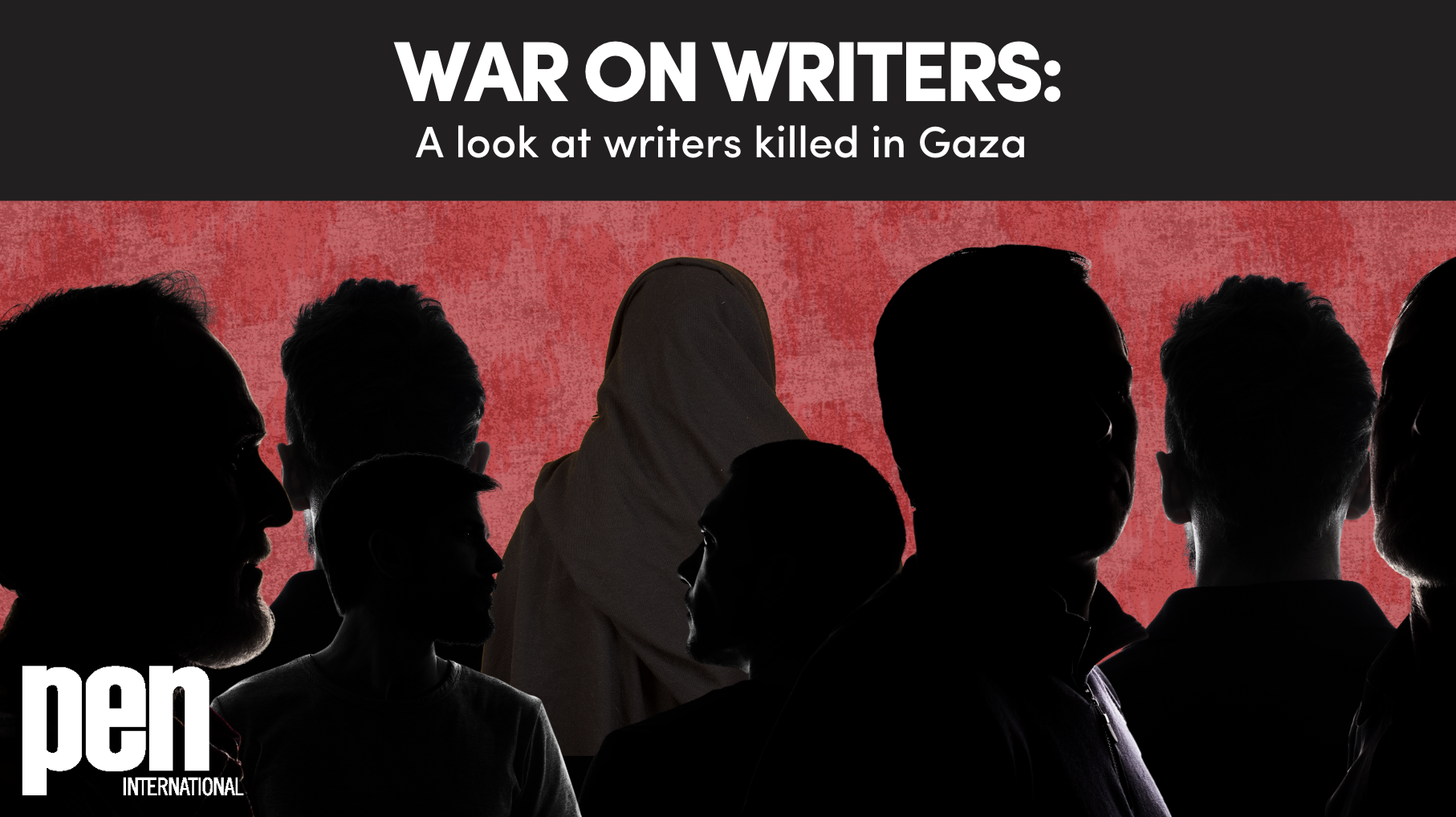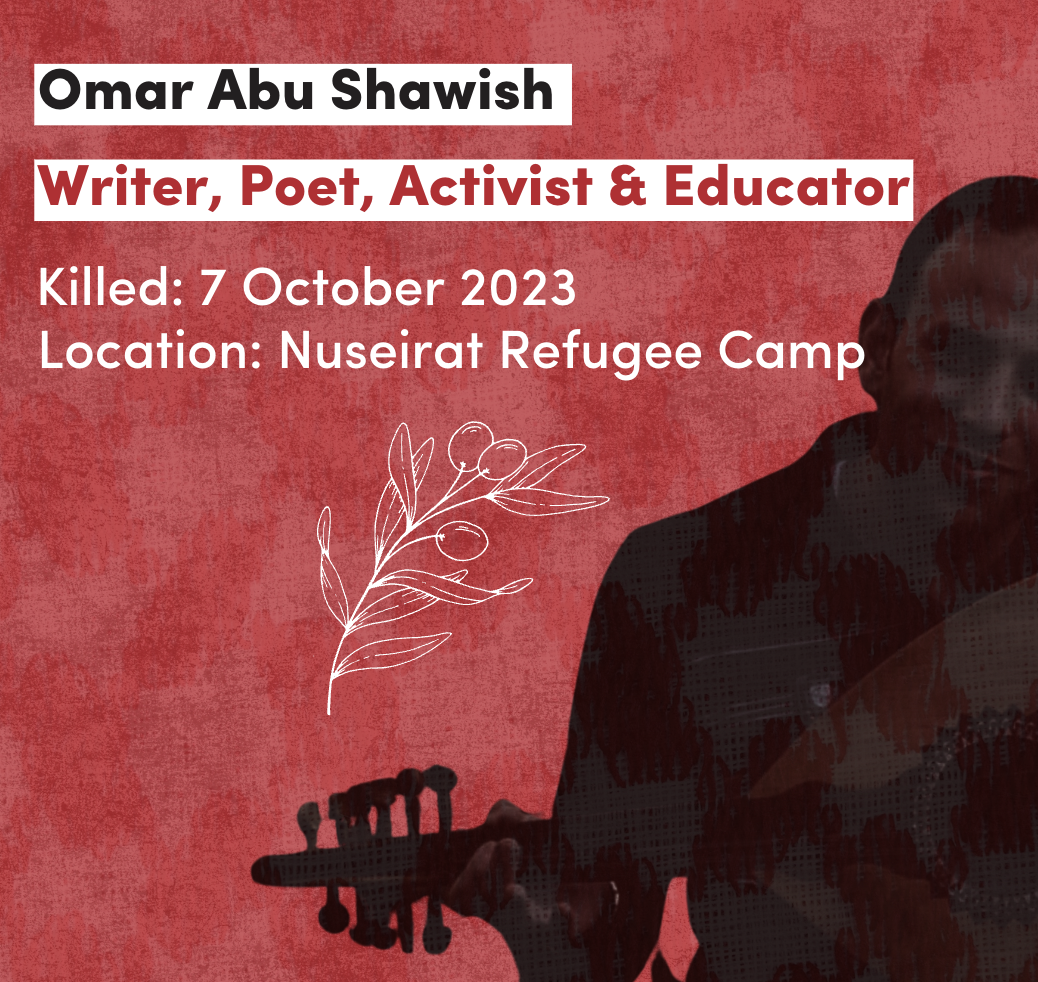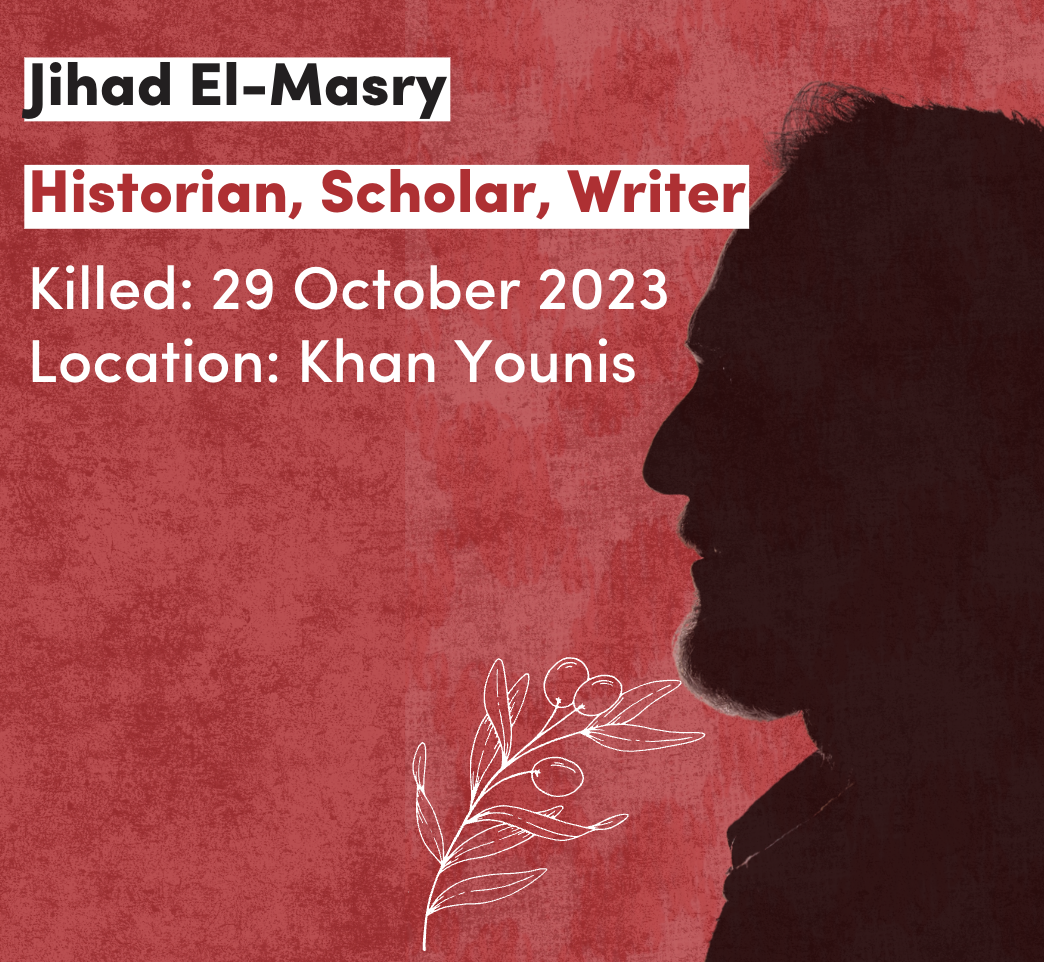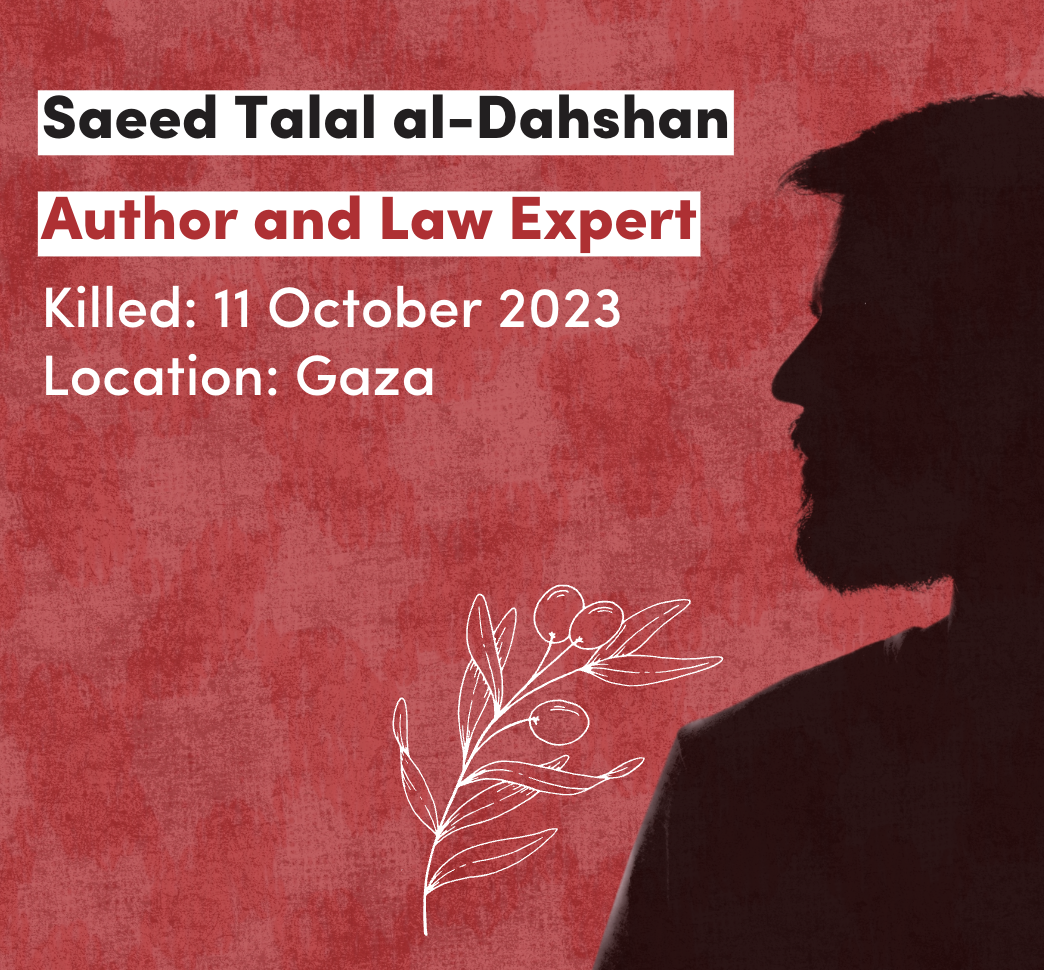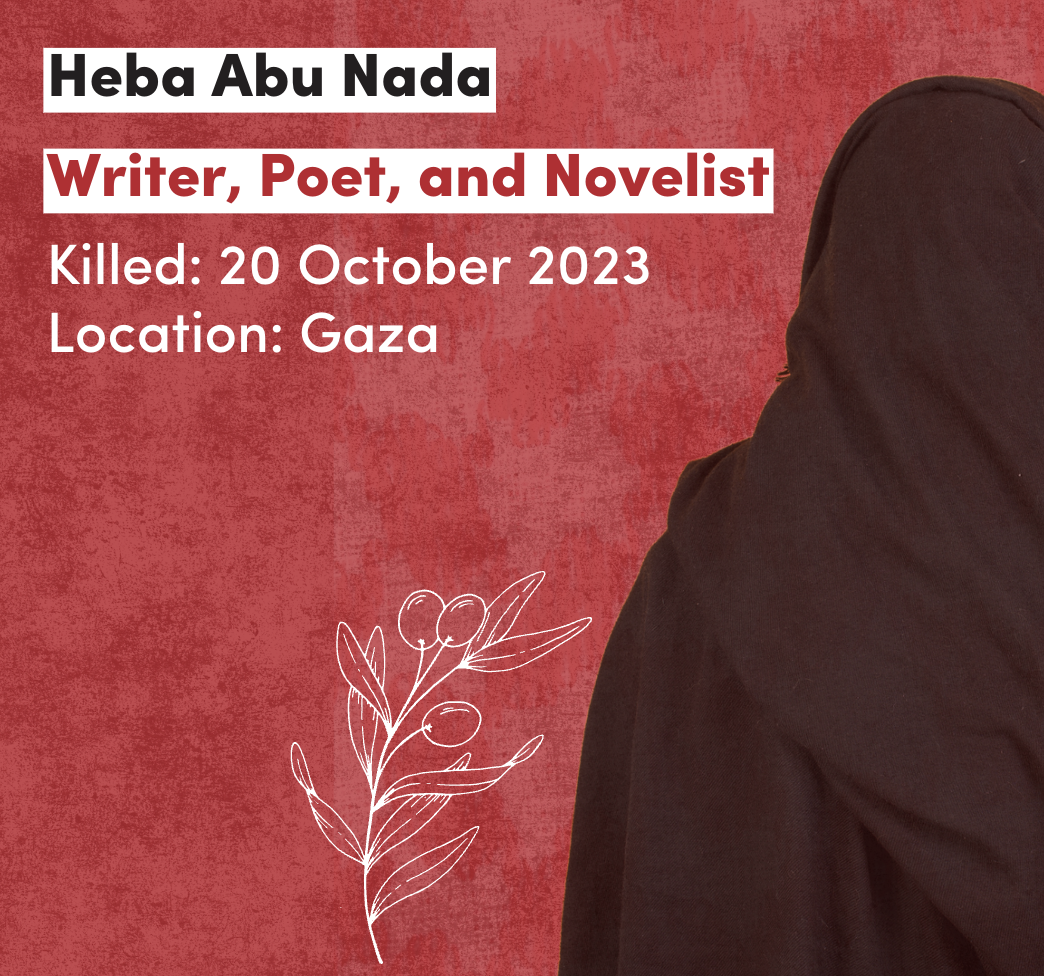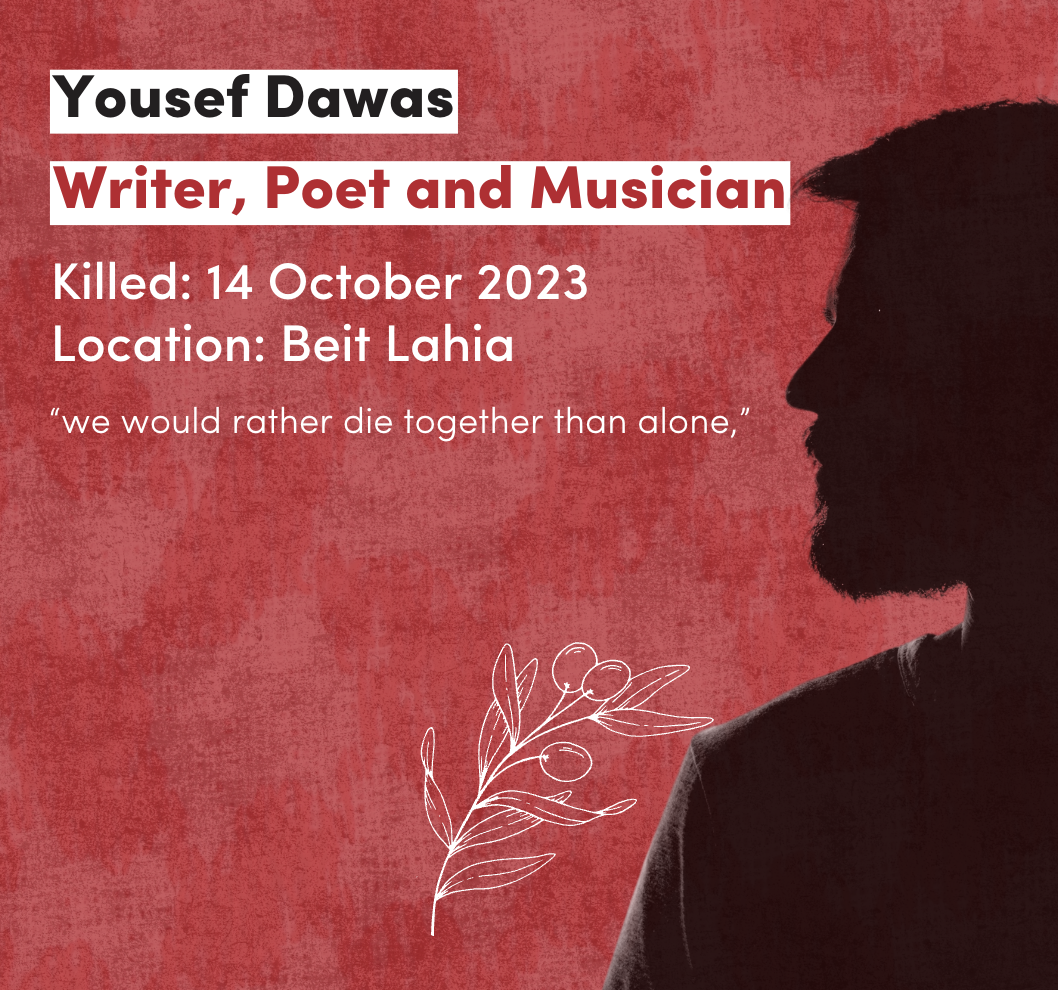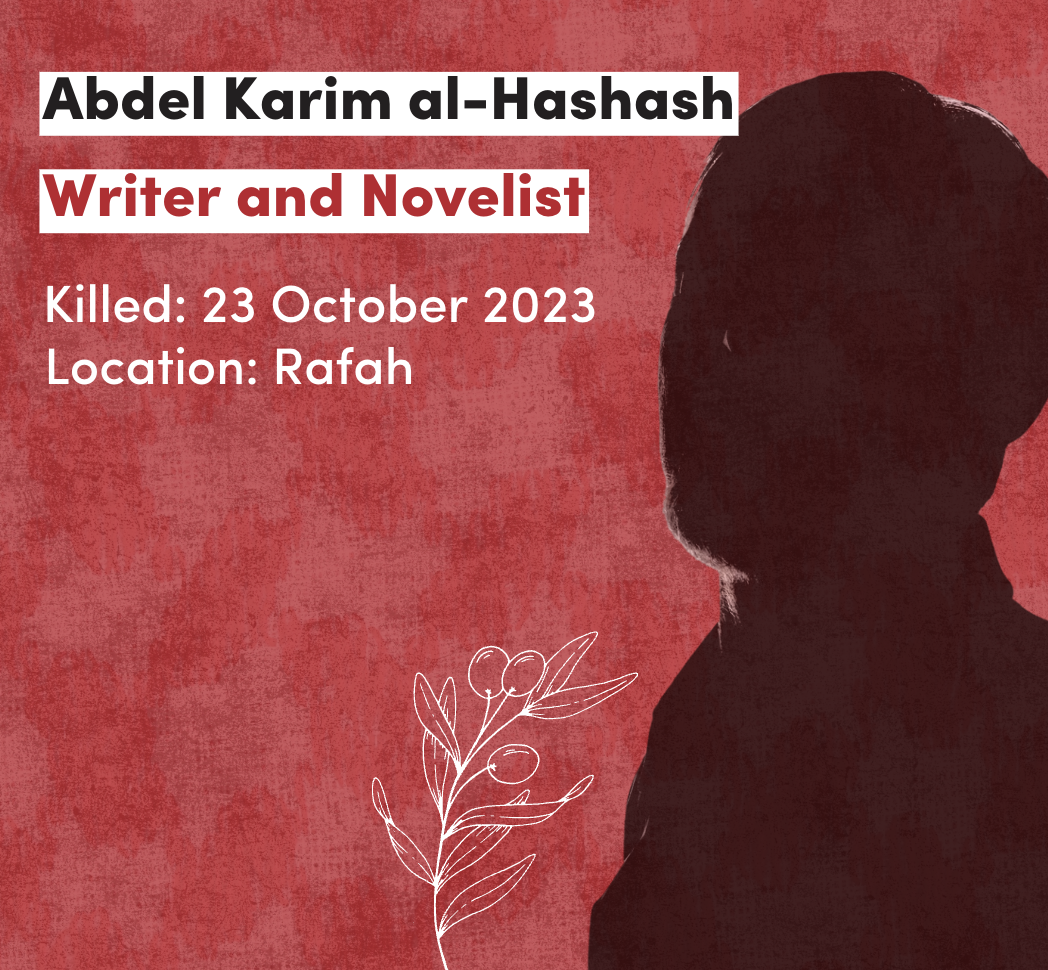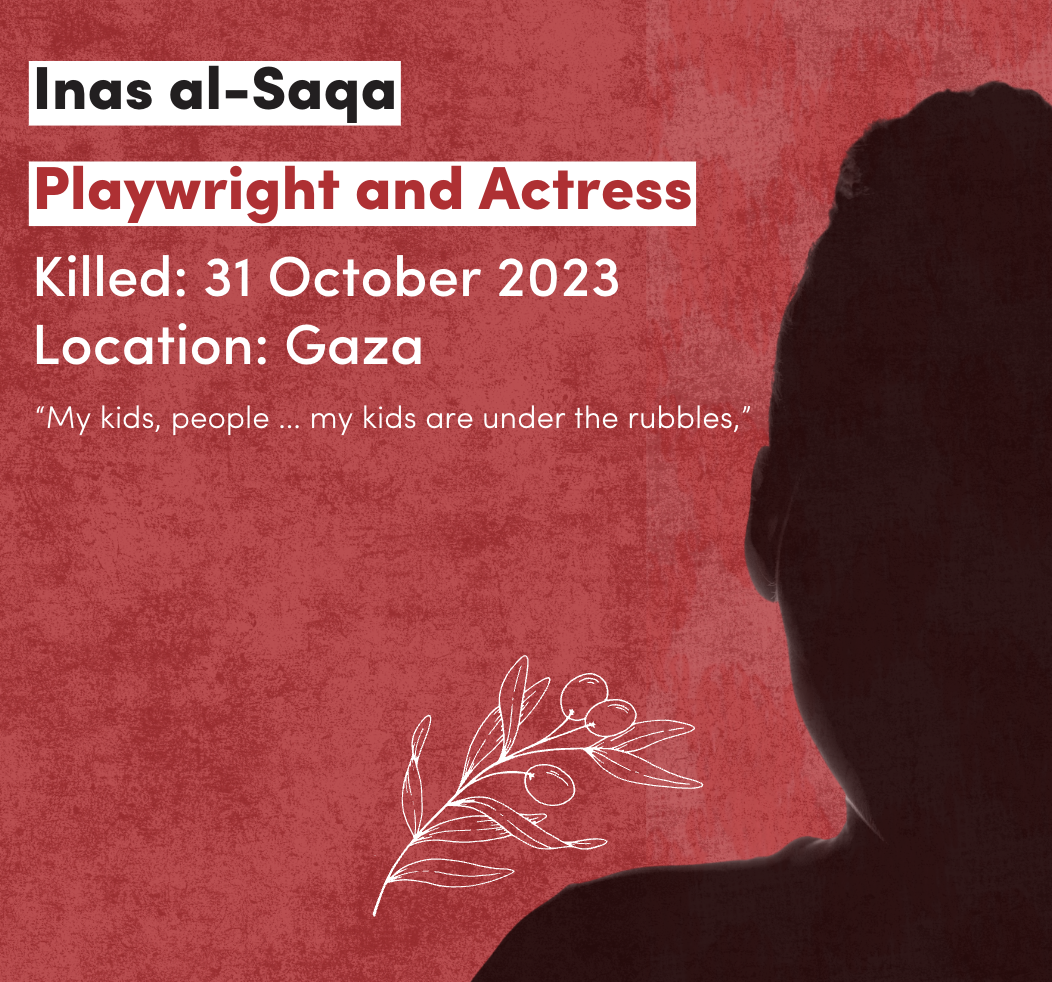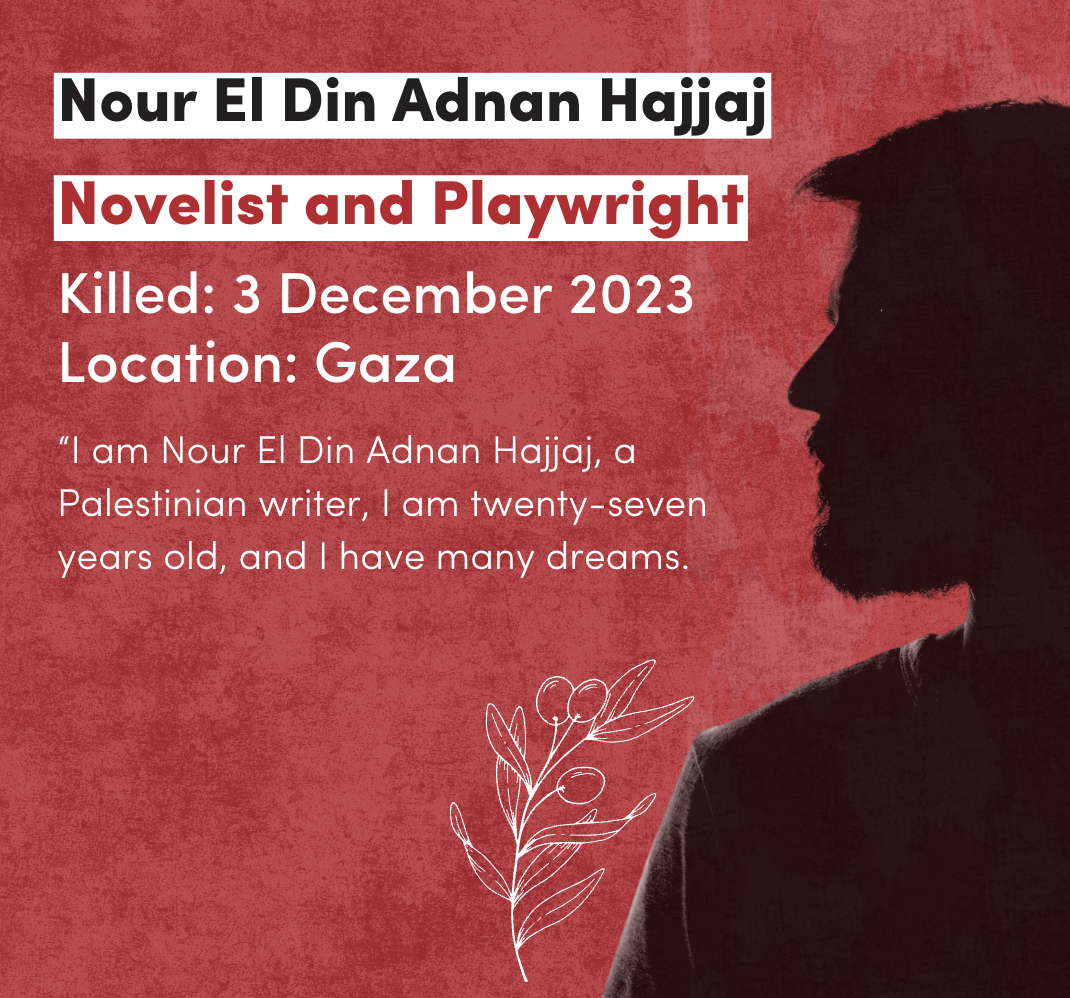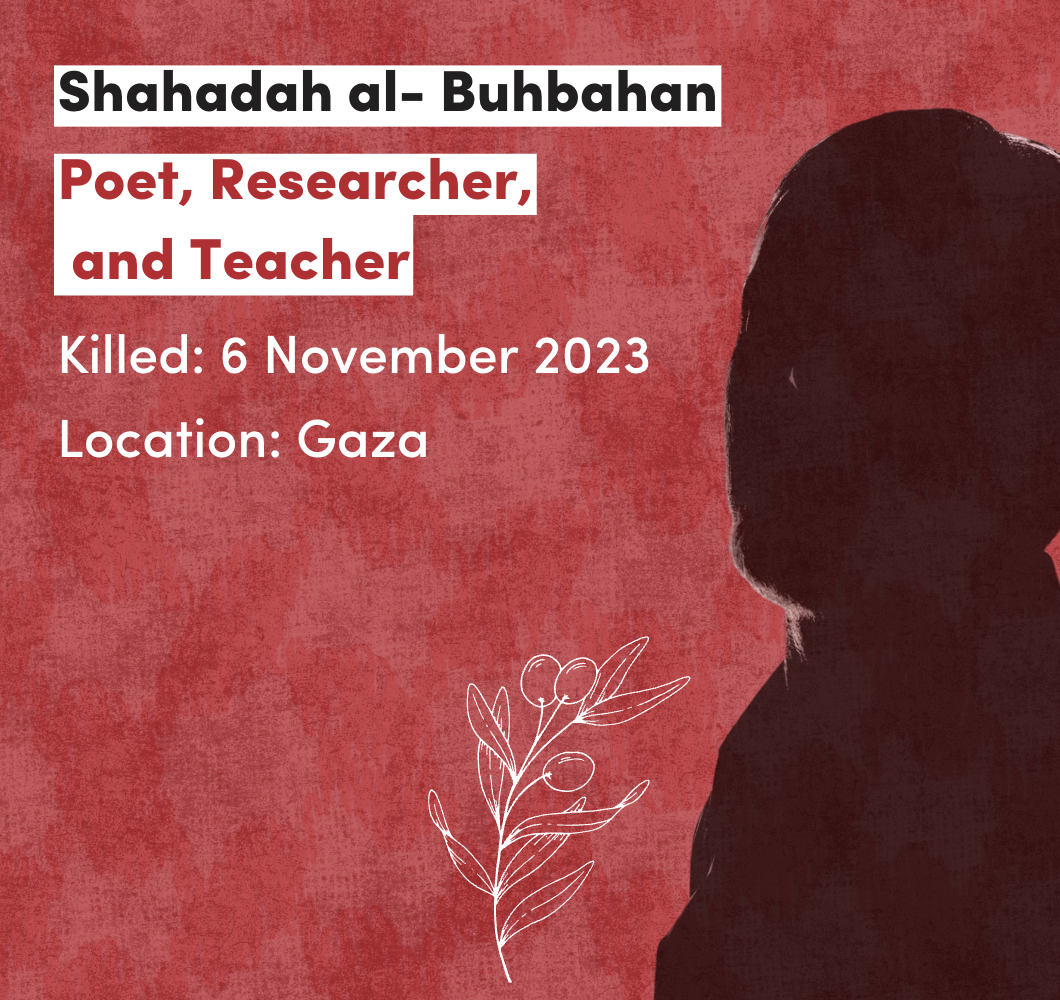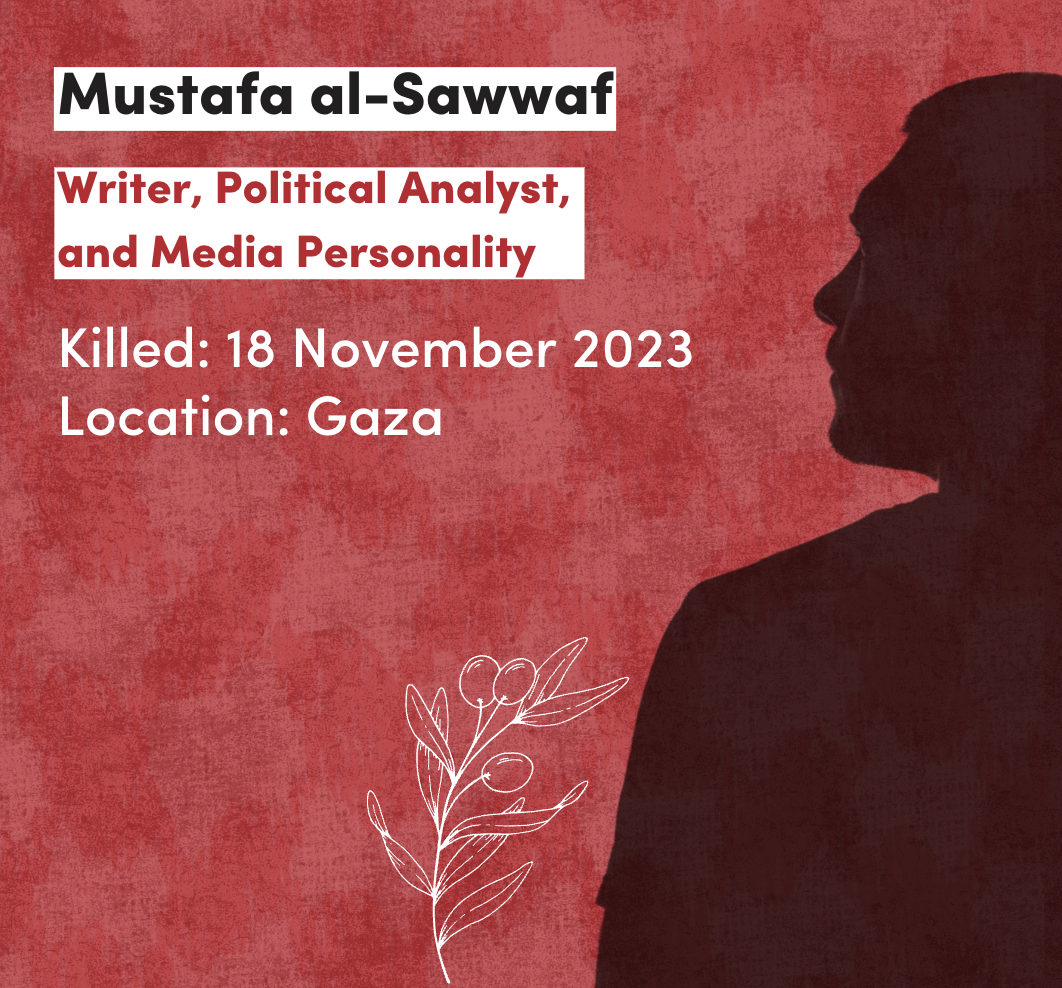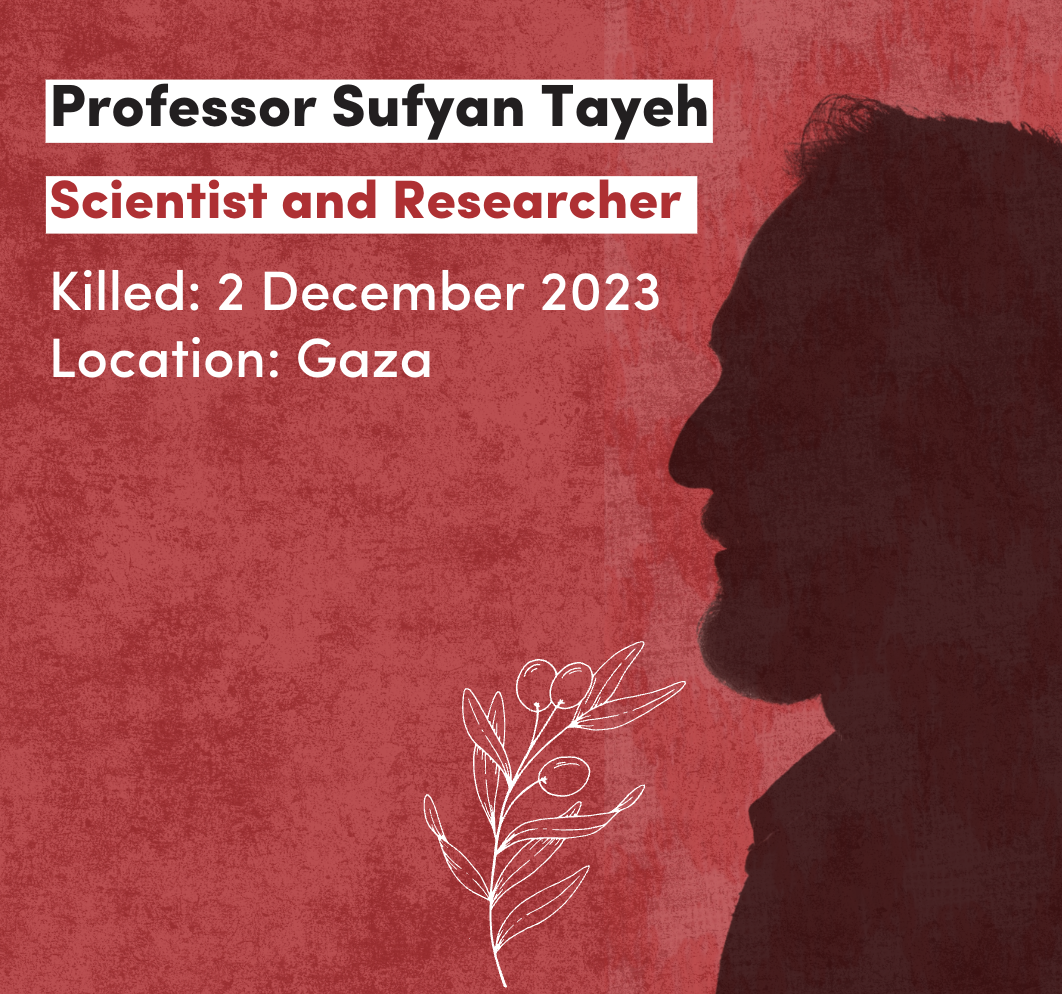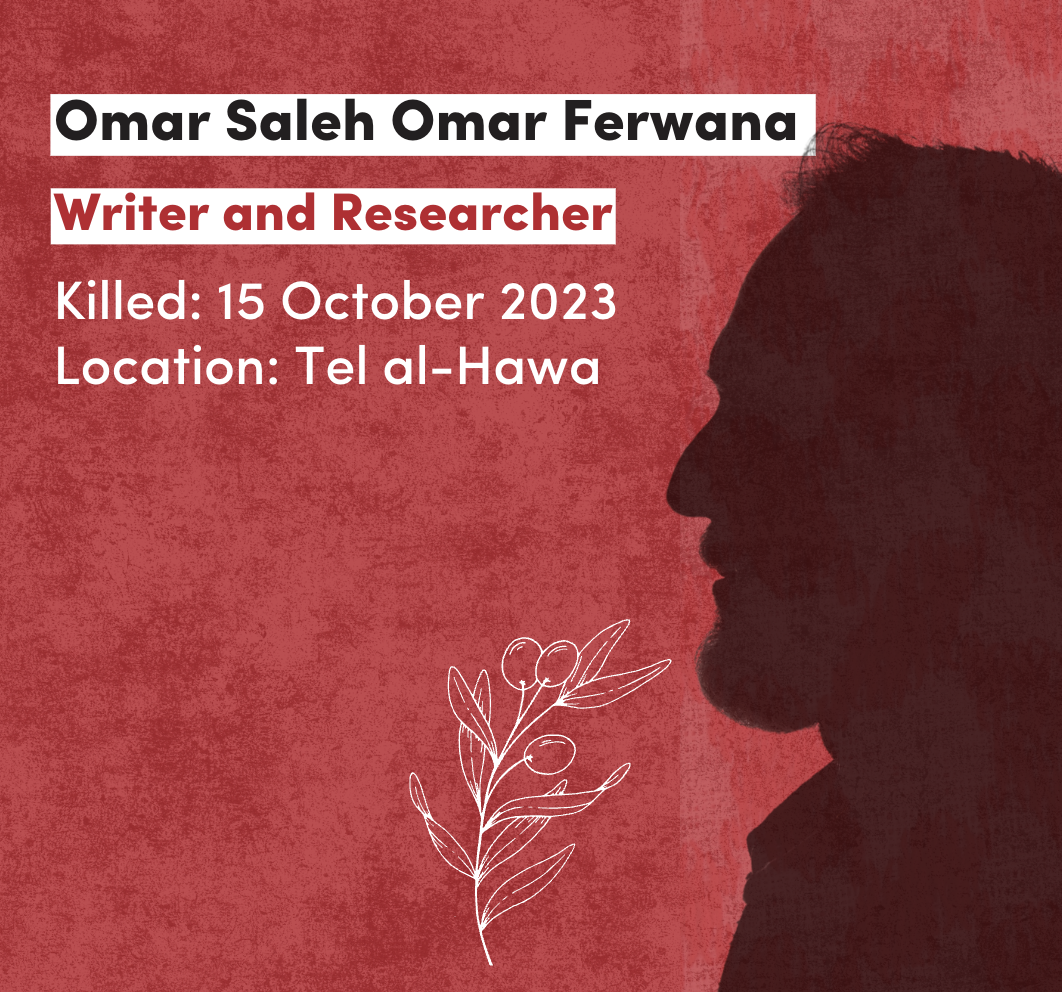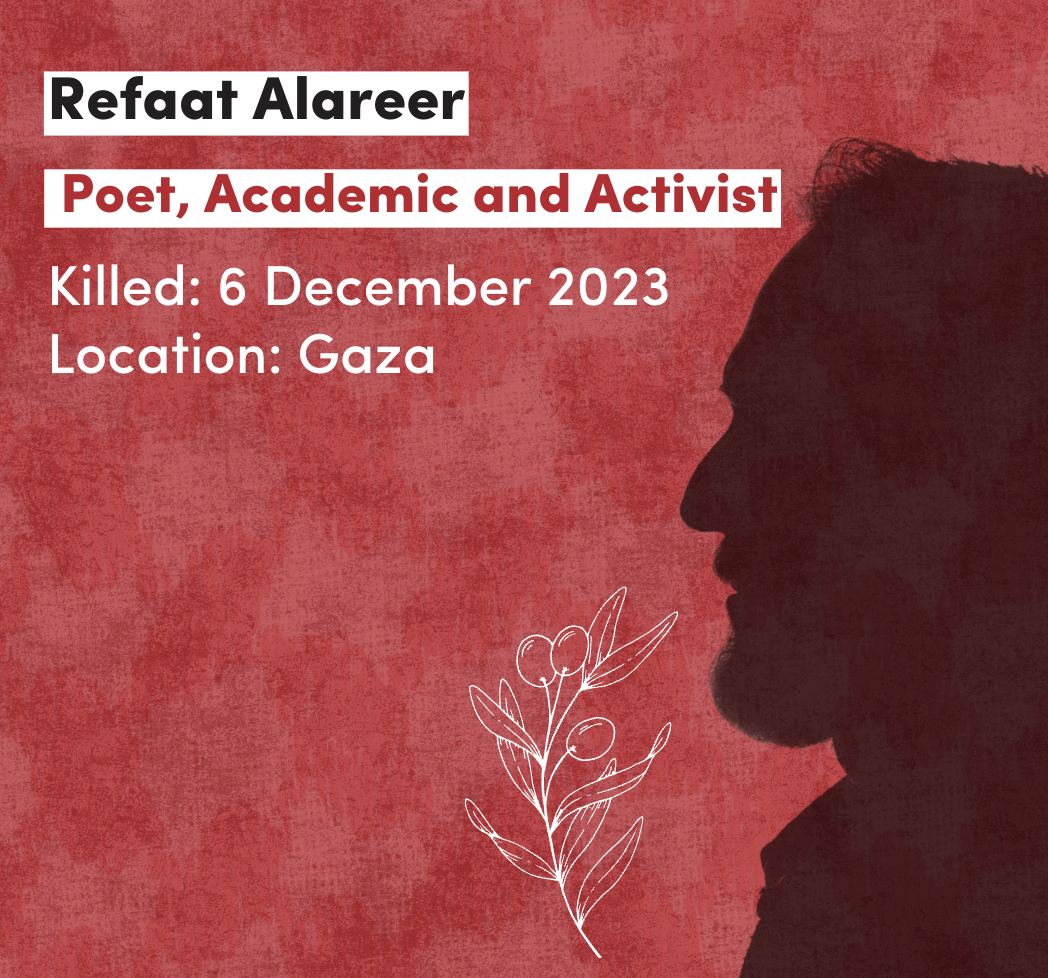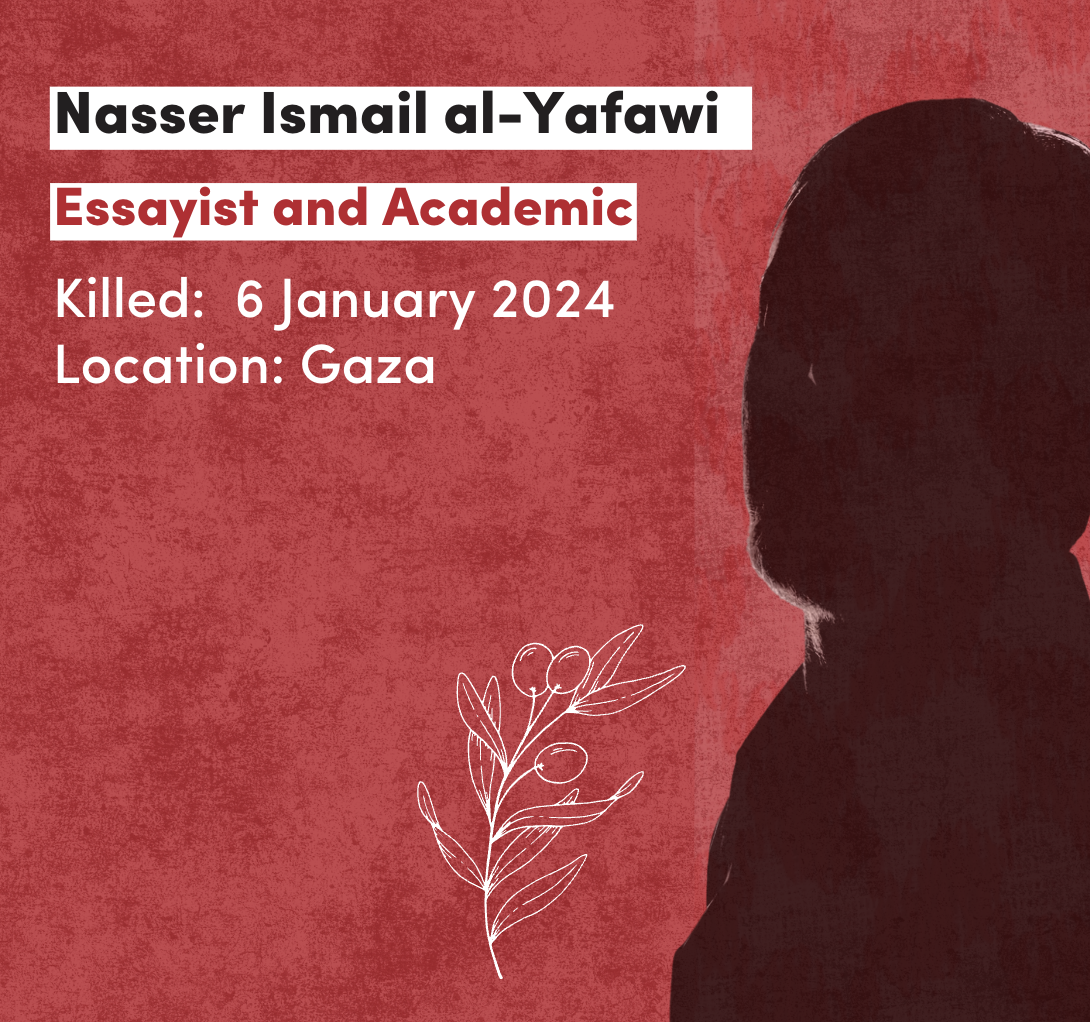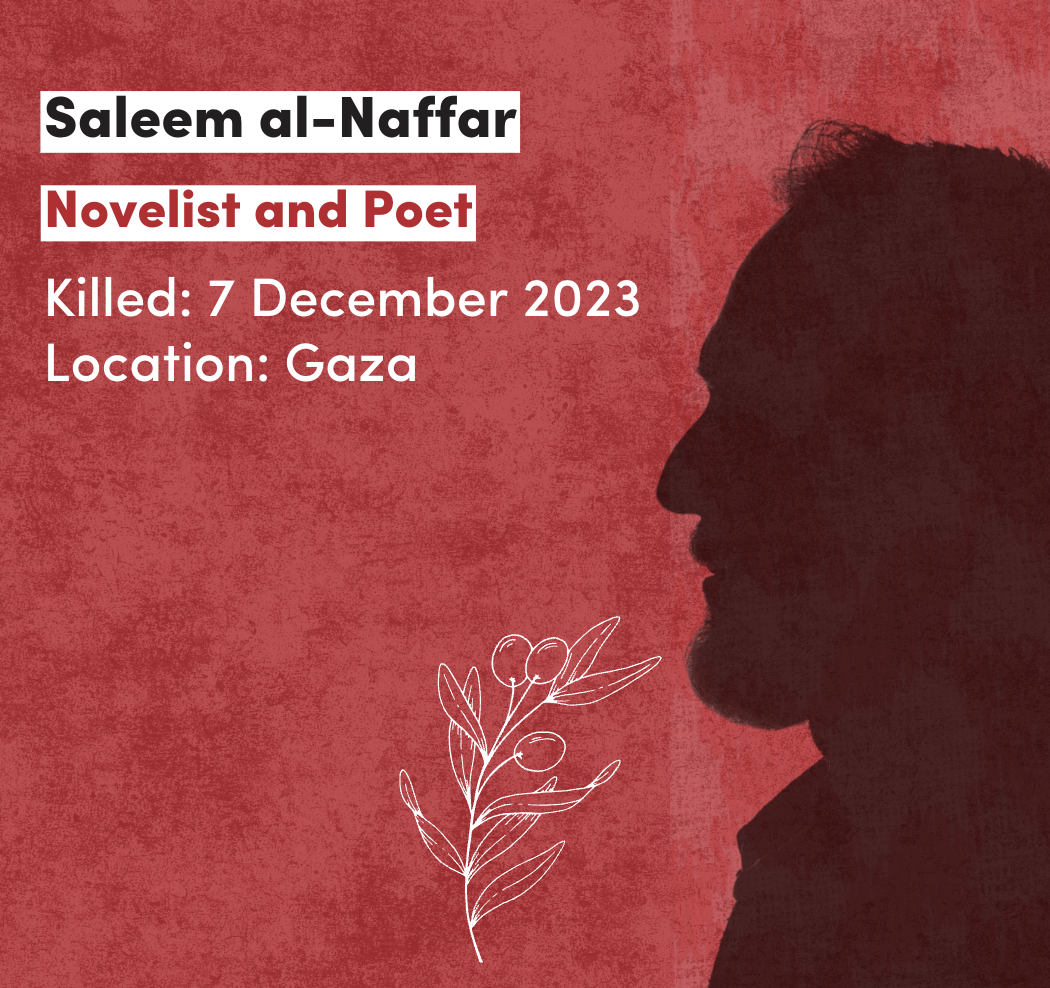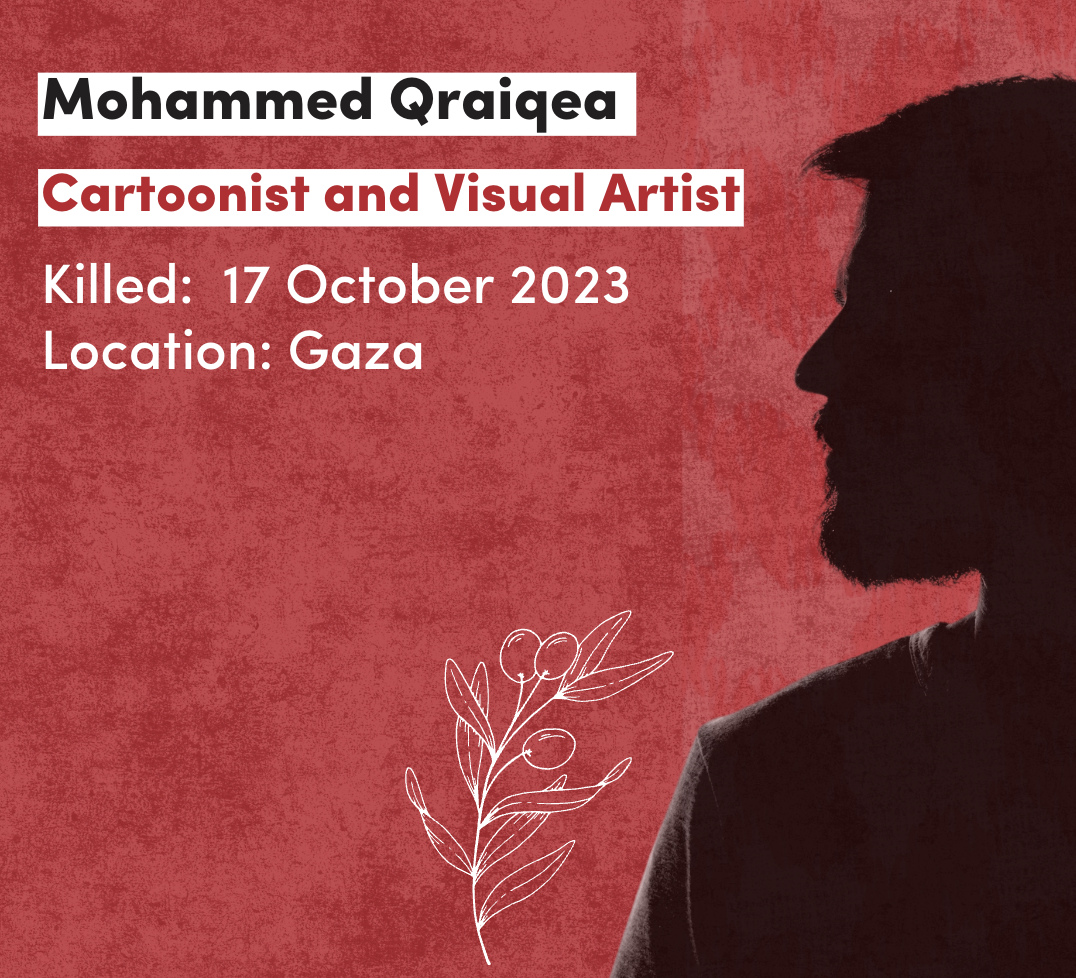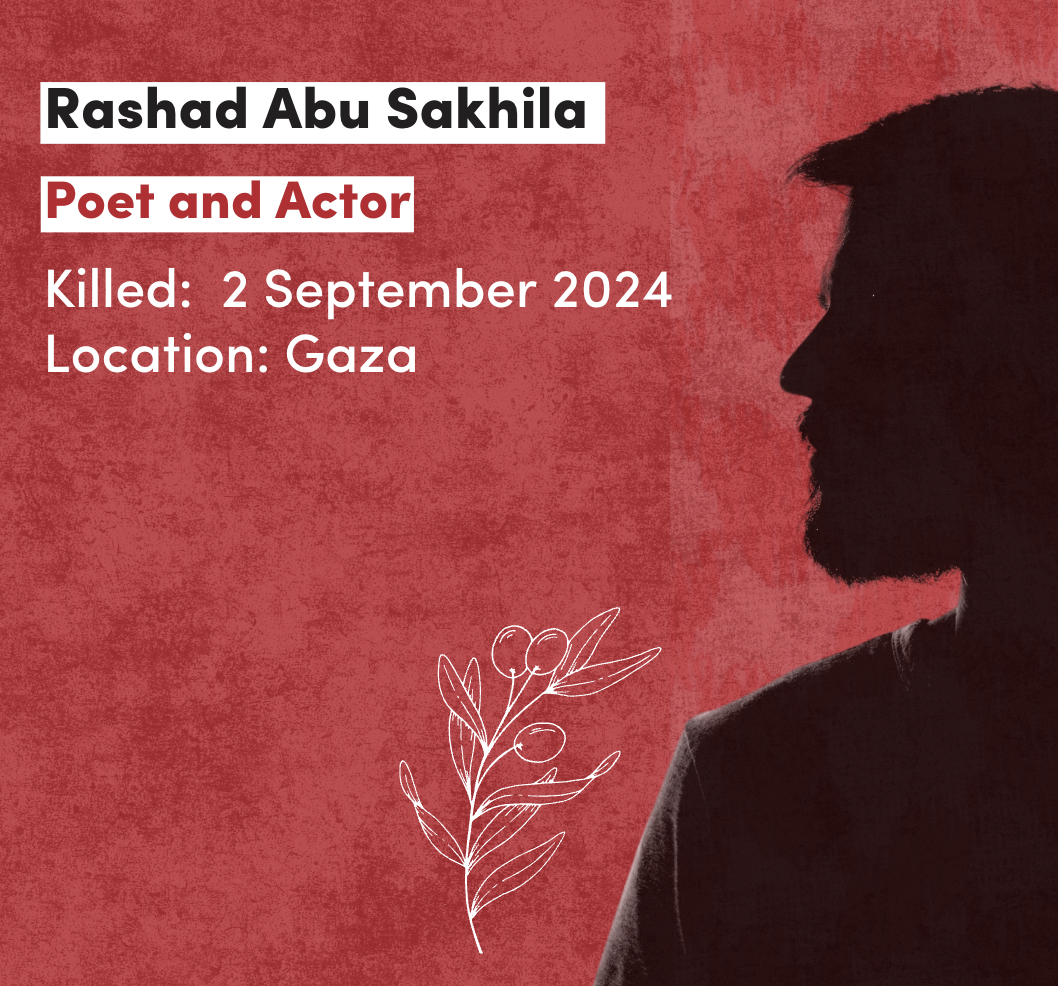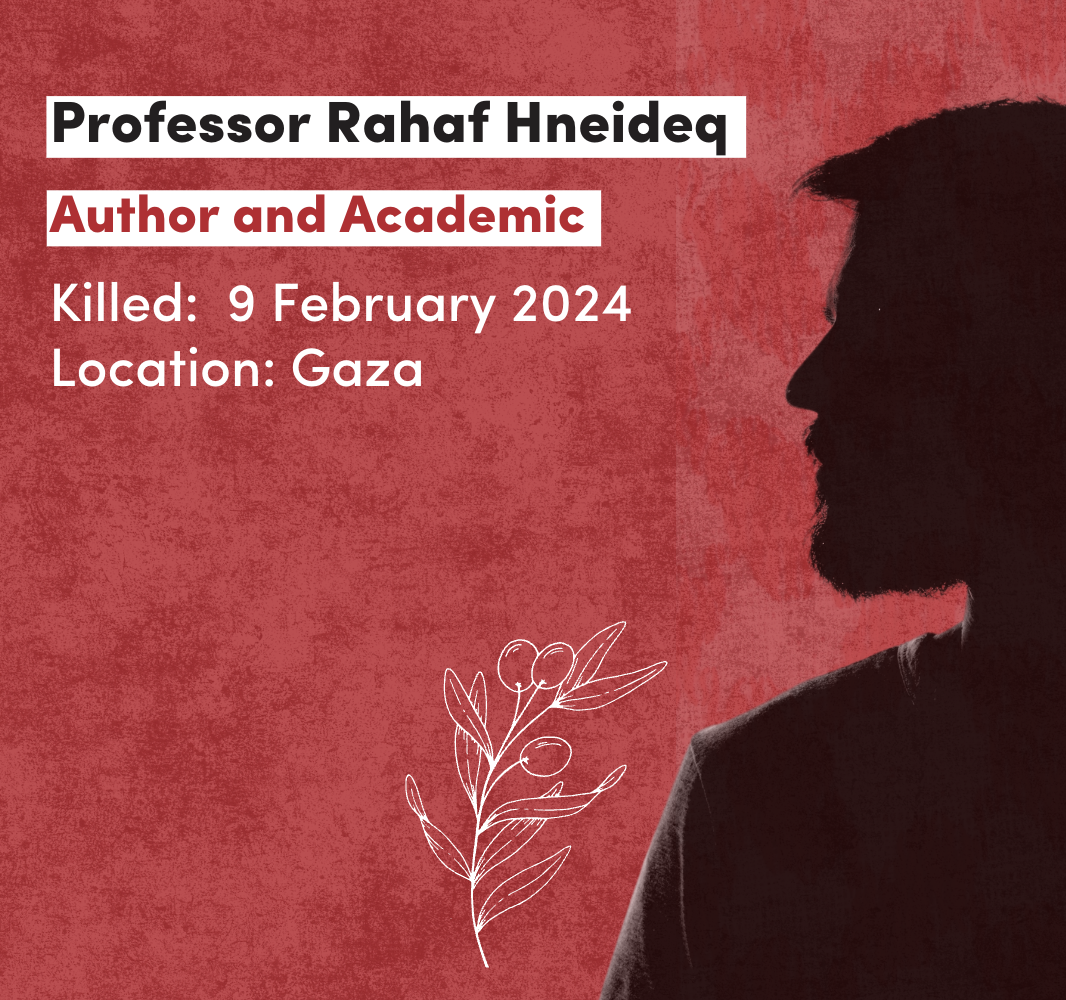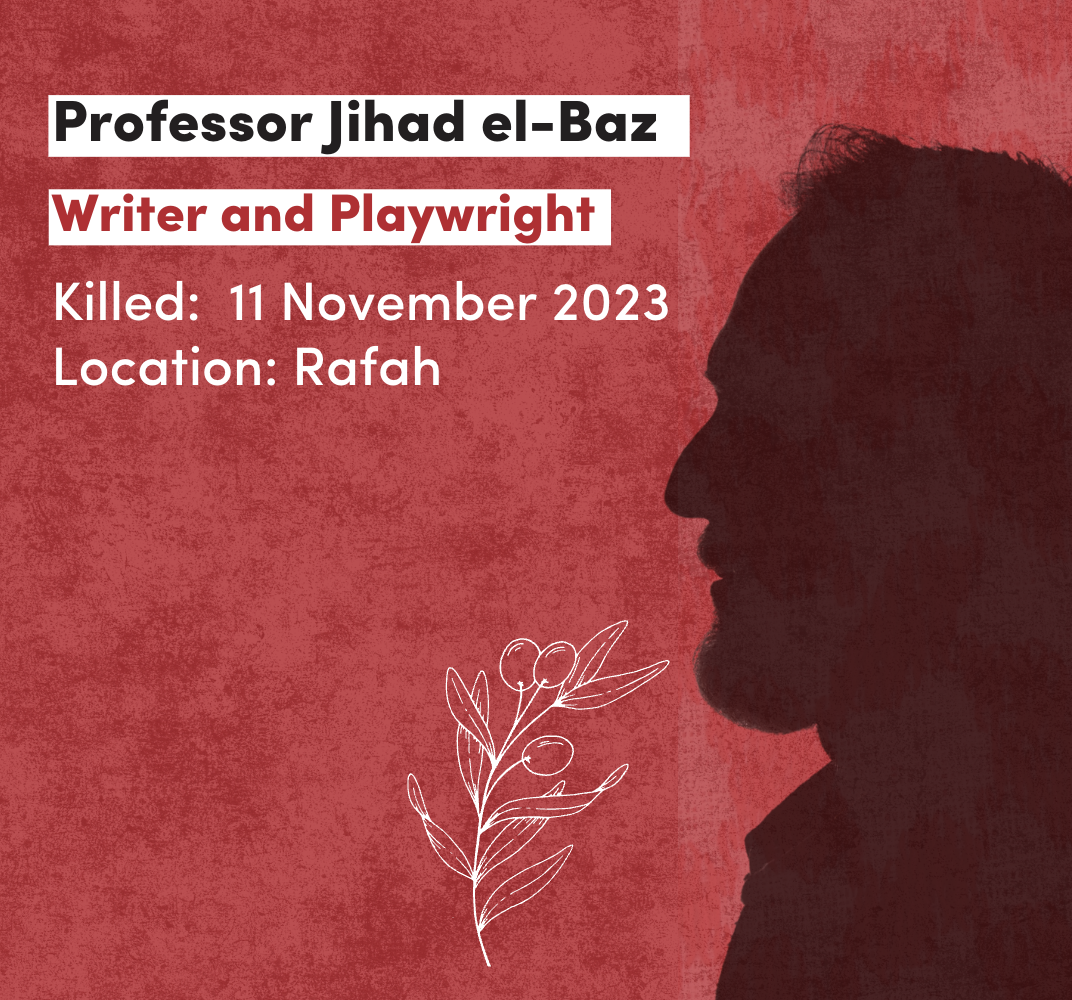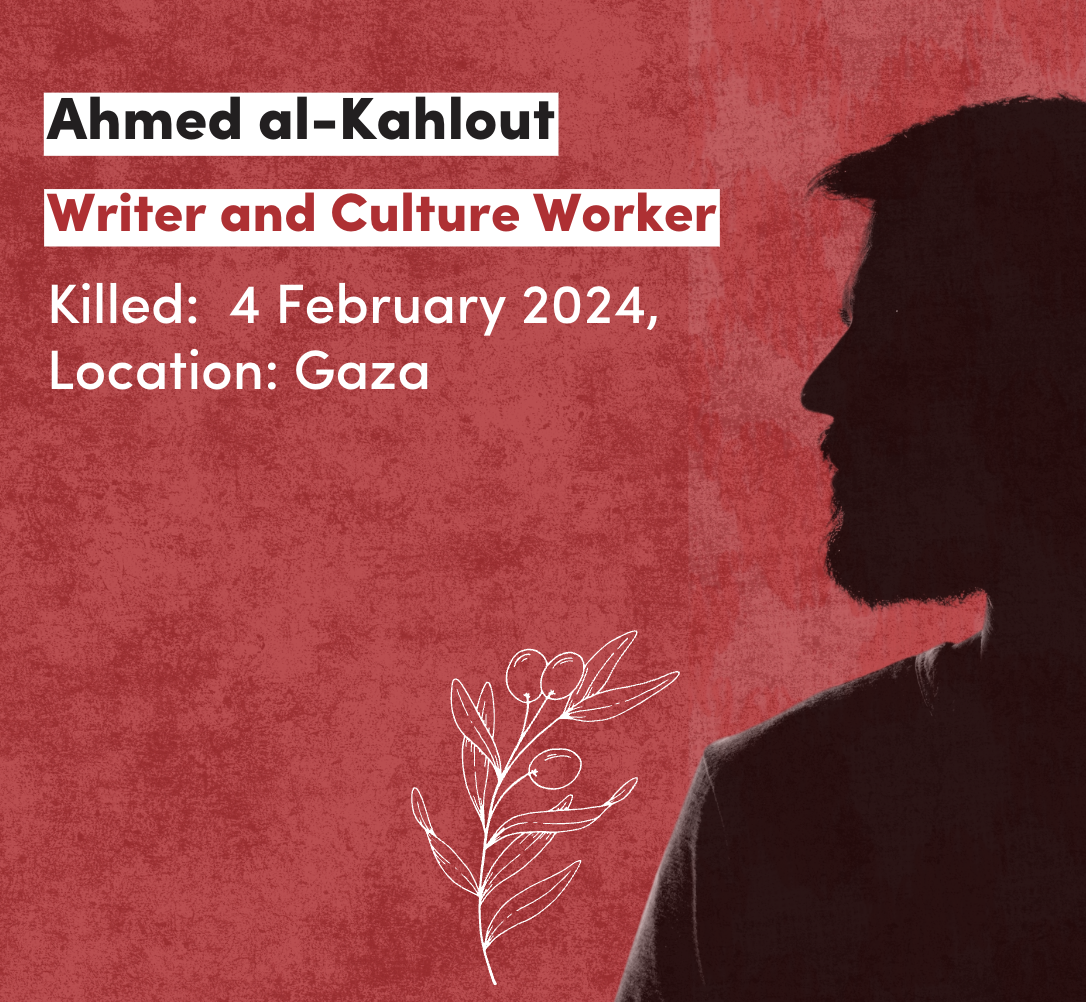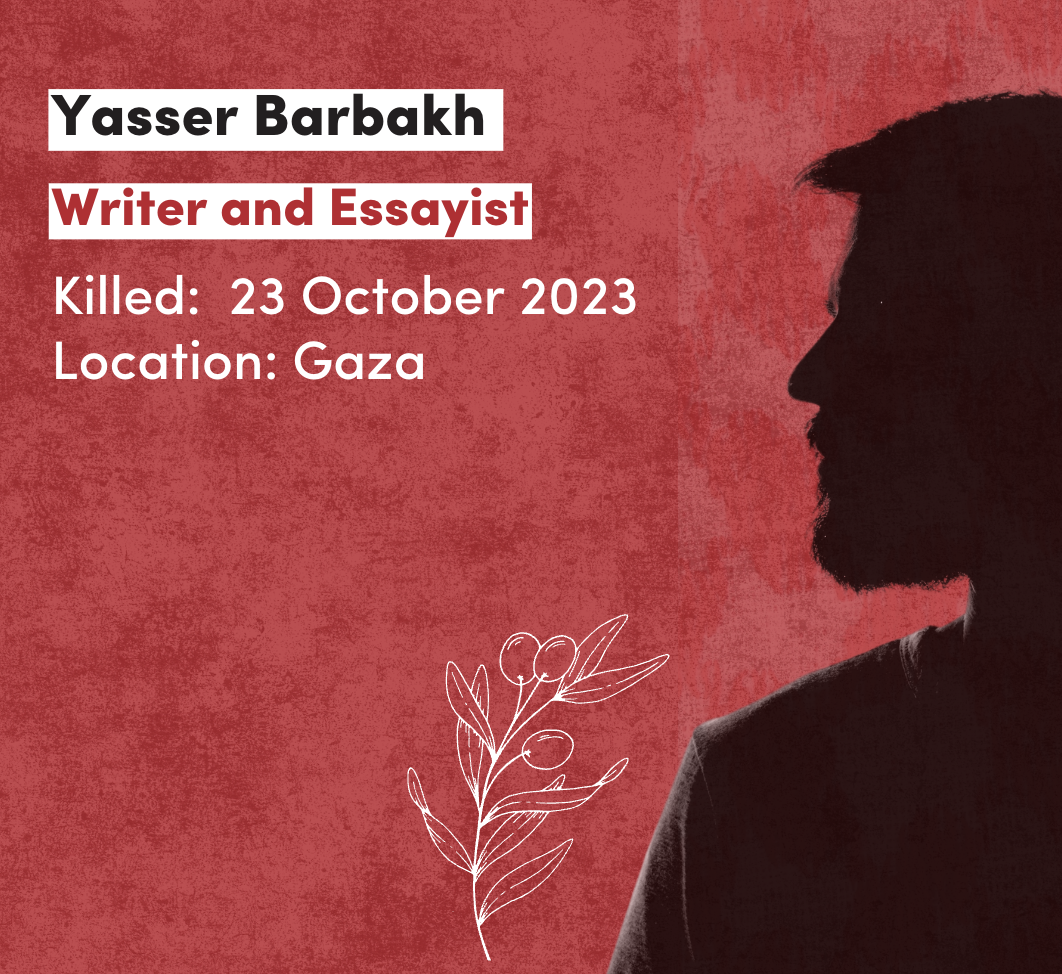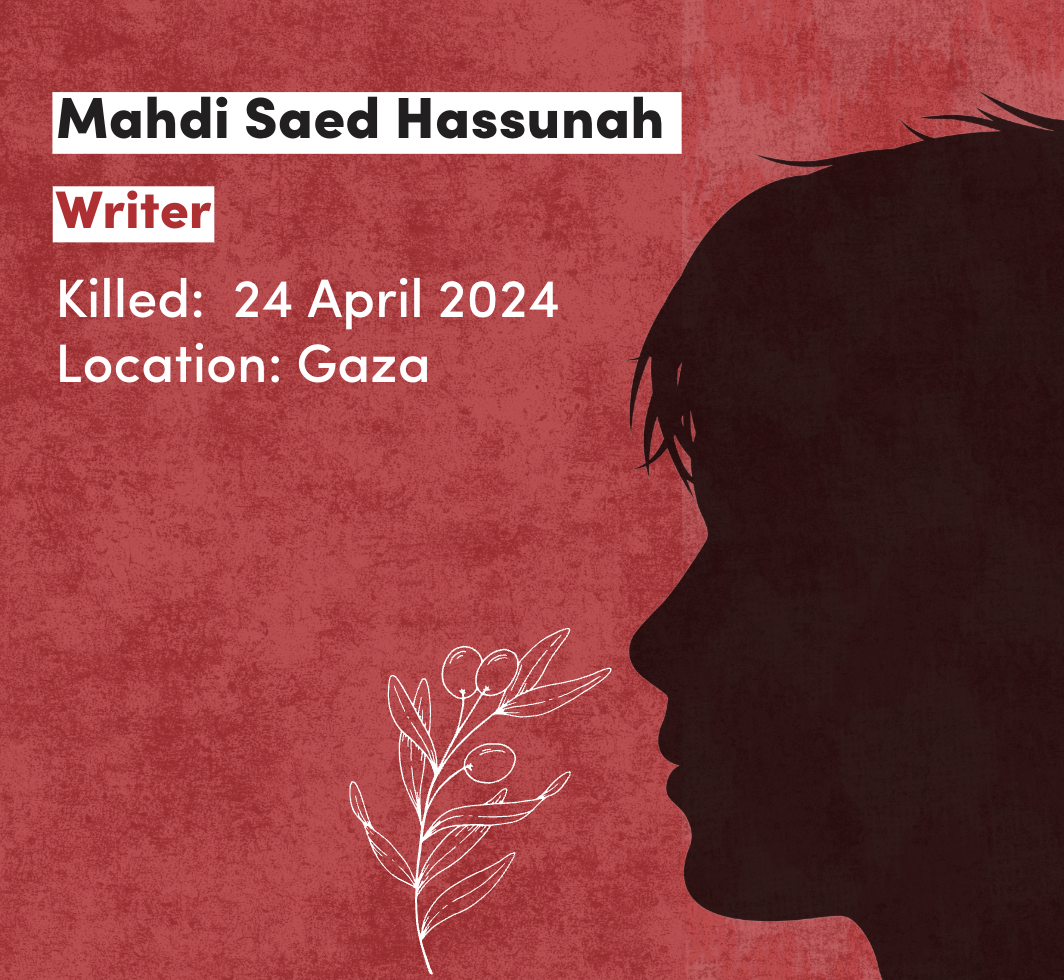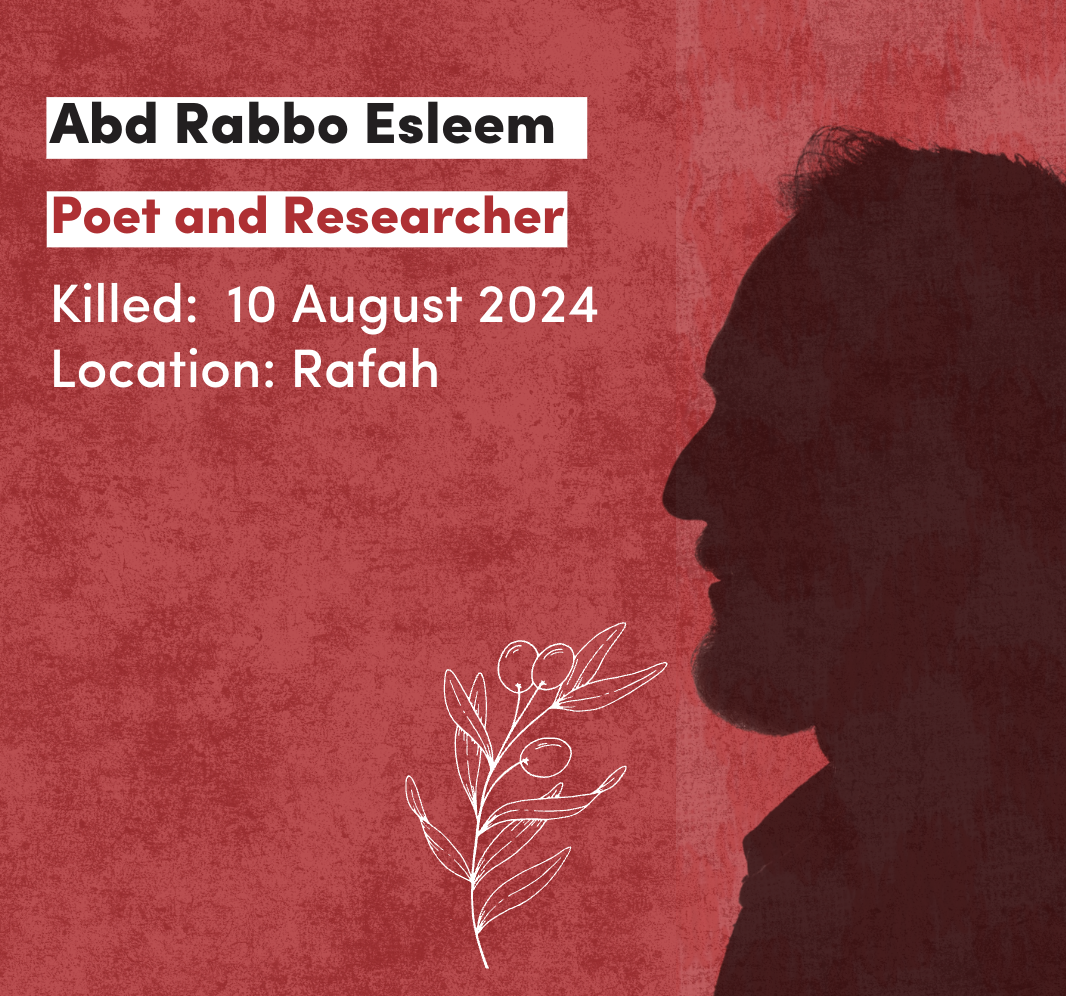War on Writers: A look at writers killed in Gaza
13 May 2023: In the face of escalating violence and turmoil, the voices of Palestinian writers have been deliberately silenced. The massive loss of life, which became a primary characteristic of the war on Gaza, included a staggering number of Palestinian artists and writers. The latest report by the Palestinian Ministry of Culture reports the loss of 45 artists, writers, and cultural activists between October 2023 and February 2024.
Launched on 6 December 2024, this project documents the cases of 23 writers and poets who were killed between October 2023 and September 2024, marking it as the deadliest conflict for writers in recent history. Such significant cultural loss represents a massive blow for the Palestinian community and poses critical challenges in its ability to fully recover at a time when tangible forms of cultural heritage, including most of Gaza’s museums, the Gaza Central Archive, and Great Omari Mosque, have been deliberately targeted and destroyed.
This collection serves as an archive honouring those writers who have been killed in Gaza since 7 October 2023. At PEN International, we believe that these stories must to be told and remembered. Through this archive, we aim to celebrate their legacies while drawing attention to the ongoing struggles faced by writers in Gaza. We will update this collection regularly to ensure that the names and works of these writers are never forgotten, as we continue to advocate for the right to free expression and the protection of all who use their voices to inspire change.
Notes:
PEN International was unable to contact all the families of the writers listed in this archive due to the severe communication challenges in Gaza and because many of the writers were killed alongside their immediate families. PEN continues to seek information about writers killed in Gaza since October 2023.
This archive includes only writers and poets. It does not cover artists or cultural workers and lists individuals whose deaths PEN International confirmed through at least two sources.
The numbers recorded by PEN International are indicative and do not represent the total number of writers killed since October 2023. They reflect cases where the organisation could confirm information about their deaths. This page is regularly updated as new information becomes available.
-
Omar Abu Shawish, a Palestinian writer, poet, society activist, and educator, was killed by an Israeli air strike on Nuseirat Refugee Camp on 7 October 2023. Abu Shawish wrote several songs and published three poetry anthologies: “تراجيديا عابرة” (Passing Tragedy), “عن شمس قادمة” (About a Coming Sun), and “وكأنها الحياة” (As If It Is Life). He also authored a novel, "على قيد الموت" (Alive in Death), 2016, which reflects on the 2008 Israeli war on Gaza.
The 36-year-old received multiple regional, local, and international awards in literature and social activism, including the Norway Friendship Prize, the Arab Leagues’ Outstanding Arab Youth Award in 2013, the Best National Song Award in 2007, and the Distinguished Volunteer and Ideal Young award in 2010. Abu Shawish managed the Popular Committee for Refugees at al-Nuseirat Camp, and was deeply involved in youth-focused social initiatives.
According to his family, Abu Shawish was killed while walking in the street in Nuseirat Refugee Camp, where he had lived his entire life and advocated for a better life for its residents. His family moved to the camp after their village of Barqa was depopulated and occupied by the Haganah's Giv'ati Brigade in May 1948.
-
Jihad El-Masry (Full name: Jehad Suleiman Salem Al Masri) was a sixty-year-old Palestinian historian, scholar, writer, and the director of al-Quds Open University’s Khan Younis branch. He died on 29 October 2023 after succumbing to the wounds sustained by Israeli shelling on Khan Younis on 17 October 2023, which also killed his wife and daughter. His works focused on Islamic, modern and contemporary Palestinian history, with multiple publications focusing on Palestinian women and Palestinians in the diaspora.
El-Masry published many books, essays, and papers in local, regional, and international journals, magazines, and newspapers. His book “رمزية مفاتيح العودة في أدبيات المرأة الفلسطينية اللاجئة وانعكاسها في أعمال المبدعين الفلسطينيين” (The Symbolism of the Key of Return in the Literature of the Palestinian Refugee Women and Its Reflection in the Works of Palestinian Creators) was published in 2011 by the BADIL Resource Centre for Palestinian Residency and Refugee Rights. The centre awarded El-Masry third place in its 2009 Return Prize in the research paper category. The book sheds light on Palestinian women's role in preserving the symbolism of the Keys of Return and passing it onto the next generations, and how this is used by artists in their advocacy on the Palestinians’ Right to Return.
El-Masry is the author of “مخيم كندا للاجئين الفلسطينيين برفح سيناء 1982-2000م: دراسة شفوية وثائقية” (The Canada Camp for Palestinian Refugees in Rafah, Sinai 1982-2000: an Oral History) (2002) and “الشهداء يعودون: دراسة شفوية وثائقية لشهداء انتفاضة الأقصى في محافظة خانيونس” (The Martyrs Return: A Documentary Oral History of the Martyrs of the Second Intifada in Khan Younis Governorate) (2002). He has also published numerous academic papers on Palestinian rights, including a paper entitled Reasons Why Gaza Palestinian Immigrants Select Belgium as Asylum Destination: A Palestinian Oral History Study (2018).
-
Saeed Talal al-Dahshan was an author and a published international law expert, focusing on Palestinian rights and Israel’s violations of international law. His best-known book, “كيف نقاضي إسرائيل؟ المقاضاه الدولية لإسرائيل وقاداتها على جرائمهم بحق الفلسطينيين” (How to Sue Israel: The International Prosecution of Israel and Its Leaders for Their Crimes Against the Palestinians), (2017), provides a detailed analysis of legal mechanisms for protecting Palestinians’ rights under international law. He also published several academic papers, including “دراسة مقارنة في الاعتداءات الإسرائيلية على قطاع غزة قبل انضمام فلسطين للمحكمة الجنائية الدولية وبعد ذلك” (Comparative Study on Israeli Attacks on Gaza Strip Before and After Palestine’s Accession to the International Criminal Court) (2021), which documents Israeli human rights violations against Palestinians from 2010 to 2019.
On 11 October 2023, an Israeli airstrike killed al-Dahshan along with his family in their home in Gaza. His friend, Mohammad Makram Balawi, Director General of the League of Parliamentarians for al-Quds, reported that al-Dahshan was killed along with his mother, wife, son, two daughters, his brother’s family, and some neighbours.
-
Heba Abu Nada was a 32-year-old Palestinian writer, poet, and novelist. Her first novel, "الأكسجين ليس للموتى" (Oxygen is not for the dead), 2017, won second place in the Sharjah Award for Creativity in the novel category. Her writings address themes of justice and the siege on Gaza. Abu Nada co-authored three poetry collections and won first place in the short stories category in a competition named after Palestinian author Nahid al-Rayyes. Some of her poetry has been translated into English. She was killed by an Israeli airstrike on 20 October 2023 in southern Gaza, after fleeing the extensive Israeli bombardment of northern Gaza.
-
Yousef Dawas was a 20-year-old writer, poet, guitar player, and aspiring psychoanalyst, as described in one of his poems. He wrote for We Are Not Numbers, a non-profit organisation founded after the 2014 war to nurture a new generation of Palestinian writers and thinkers sharing the stories of Palestinians killed by the Israeli occupation.
In January 2023, Dawas wrote an article titled Who will pay for the 20 years we lost? describing the destruction of his family’s century-old farmland by Israeli bombardment during the offensive on Gaza in 2022, which coincided with Eid, a major Muslim celebration. He also contributed an article for the Palestine Chronicle about a young Palestinian couple from Gaza facing challenges in traveling to Egypt for a kidney transplant.
On 14 October 2023, an Israeli airstrike killed Dawas and 27 members of his family in their home in Beit Lahia. Before his death, Dawas had expressed his wish to see the rest of Palestine and the world beyond Gaza, which Israel has besieged since he was four years old. During the 2022 Israeli assault on Gaza, he wrote that if his family were to die, they wished to die together: “we would rather die together than alone,” This was the only wish that came true.
-
Abdel Karim al-Hashash was a 76-year-old Palestinian writer who published over forty books and novels in addition to articles across the Middle East. He was known as the Guardian of the Palestinian Heritage, due to his writing focusing on the Palestinian, Arab, and Bedouin heritage. An Israeli airstrike killed him alongside other family members in their house in Rafah on 23 October 2023. Al-Hashash lived almost all his life as a refugee.
He was born in 1947 in the then-Palestinian city Beersheba, now known as Be'er-Sheva, and his family fled to Rafah Refugee Camp in Gaza due to the Nakba War in 1948, during which hundreds of thousands of Palestinians were displaced.
After the 1967 war, he moved to Jordan and then Syria, where he lived in al-Yarmouk Refugee Camp. There, he established the al-Aqsa library, which contained thousands of books, including rare copies. His library was a crucial resource for researchers, writers, and students in Syria but was tragically destroyed during the Syrian Civil War. Due to the escalating violence, he returned to Gaza where he continued writing while rebuilding his book collection for a new library.
He wrote several novels, including “النخلة العاقر”(The Barren Palm Tree) (2002) and “أرض القمر”(The Land of the Moon) (2000), and his books include “معجم الألفاظ المحكية في البلاد العربية”(TheDictionary of Colloquial Words in Arab Countries) (2007) and “قبائل وعشائر فلسطين” (Tribes and Clans of Palestine) (2004).
-
Inas al-Saqa was a 53-year-old Palestinian playwright, actress, and a pioneer in theatre production. She wrote and produced numerous plays, including “الدب” (The Bear) and “في شئ عم بيصير”(There’s Something Going On). She delivered theatre workshops to children and communication workshops to adults, actively participating in various community activities.
On 31 October 2023, an Israeli airstrike killed al-Saqa along with three of her children, Leen, Sara, and Ibrahim, leaving two of her daughters critically injured, with one of them, Farah, suffering from walking disability and pelvic and spinal fractures. Before her death, al-Saqa and her family had been displaced multiple times, initially seeking refuge at Gaza’s Orthodox Cultural Centre with other families. They later evacuated the centre, following instructions from the Israeli Army, to a friend’s house, where they were tragically killed.
As an actress, al-Saqa focused on the struggle of Palestinians, especially women, and the suffering they endured since the Israeli occupation and during successive wars. She is known for her role in the film “ميلاد” (Birth) (2008), about a Palestinian woman giving birth during wartime, a harrowing experience she experienced herself. Al-Saqa also starred in “سارة” (Sarah) (2014) about honour killings in Gaza, and “عصفور الوطن” (The Homeland’s Sparrow), which highlights the Palestinian struggle since the Nakba in 1984.
She also acted in numerous plays, including a Palestinian adaptation of Arthur Miller’s classic All My Sons, and “نساء غزة وصبر أيوب” (Job’s Sufferance in Gaza’s Women), about the plight of women in Gaza during Israel’s attacks. One of her most memorable and poignant theatrical lines in Job’s Sufferance in Gaza’s Women was, “My kids, people … my kids are under the rubbles,” a heartbreaking reflection of the tragedy that struck her family in October 2023, when Inas and her children were killed during the Israeli bombardment of Gaza.
-
Nour El Din Adnan Hajjaj government, and wars and killing resulting from occupation. He also wrote a play titled “الرماديون” (The Grey Ones), performed in 2022, and participated in local cultural initiatives, including Shaghaf (Passion) by the Cordoba Association, and the Days of Theater Foundation.
Hajjaj documented his experiences of war on his Facebook account, with many of his diaries translated and republished by Passing Through Genocide, an initiative aimed at highlighting the work of Palestinian “writers confronting the genocide in Gaza.” Throughout the ongoing war on Gaza, Hajjaj wrote about his suffering and the inability to express his desperation and fear due to internet blackouts caused by Israel’s destruction of civilian infrastructures and its intensified siege on Gaza.
His death from Israeli airstrikes was reported on 3 December 2023, and was linked to the al-Shujaiya Massacre, perpetrated by the Israeli Army on 2 December 2023. According to the OHCHR, Israeli airstrikes struck residential houses in two neighbouring blocks in one of the most densely populated neighbourhoods in eastern Gaza City, resulting in at least 60 deaths, the destruction of 15 buildings, and the damage of at least 14 others.
Here is an extract of his last message to the world [Translated from Arabic]:
“I am Nour El Din Adnan Hajjaj, a Palestinian writer, I am twenty-seven years old, and I have many dreams.
I am not a number and I refuse for the news of my death to be fleeting, without you saying that I love life, happiness, freedom, children's laughter, the sea, the coffee, writing, Fairuz [Lebanese Iconic Singer], and everything that is joyful... before all of this disappears in a single moment.
One of my dreams is for my books and writings to travel the world, for my pen to have wings that are not stopped by unstamped passports or rejected visas... and my biggest dream remains... for peace to prevail in my country, for children's laughter to shine before the sun, for us to plant a rose in every place where a bomb fell, and to draw our freedom on every destroyed wall, for the war to leave us alone; so that we can finally live our lives for once.”
-
Shahadah al- Buhbahan (73) was a Palestinian poet, researcher, and teacher who wrote nine poetry anthologies primarily focused on the Palestinian struggle and Islamic heritage and history. He co-authored a book on Arabic poetry with Egyptian poet Mona al-Ghareeb. Al-Buhbahan lived in the Bureij Refugee Camp in Gaza and earned his BA in Islamic Education from the Faculty of Dar al-Uloom at Cairo University in 1974, and his MA in Education from the Islamic University in Gaza in 2003. He was killed on 6 November 2023 by an Israeli airstrike, along with his wife, grandchild, and extended family members.
-
Mustafa al-Sawwaf (68) was a famous Palestinian writer, political analyst, and media personality who wrote hundreds of articles and essays for local and international outlets. He was the founder and chief editor of Gaza’s first daily newspaper, according to the Palestinian Ministry of Culture. On 18 November 2023, al-Sawwaf, his wife, two of his children, and several family members were killed by an Israeli airstrike on his home in Gaza City. The strike also injured two of his sons: Mohamed al-Sawwaf, director at Alef Multimedia, and Montasser al-Sawwaf, photojournalist at the Turkish news agency Anadolu. Montaser was killed on duty on 1 December 2023.
-
Professor Sufyan Tayeh (Sufyan Abdul Rahman Tayeh) was a prominent scientist and a pioneer researcher in theoretical physics and applied mathematics, with hundreds of published scientific papers. Born in 1971 in Jabalya Refugee Camp, he attended UNRWA schools, and earned his BA, MA, and PhD from the Islamic University in Gaza, where he became a lecturer in 1994 and later headed the physics department from 2008 to 2011.
He was ranked among the top 2% of researchers worldwide, based on a study conducted by Elsevier and Stanford University, and was appointed the UNESCO Chair for Physical, Astrophysical, and Space Sciences in Palestine. In July 2023, Tayeh was appointed President of the Islamic University in Gaza. A fellow at the International Centre of Theoretical Physics (ICTP) in 2001 and 2004, ICTP Director Atish Dabholkar described him as a “mentor and inspiration” to many researchers at the centre.
On 2 December 2023, an Israeli airstrike killed Tayeh along with his entire immediate family and members of his extended family. His brother, a fellow scientist, reported that the Israeli bombardment destroyed six of their family homes and killed 30 members of his family, many of whom were medical doctors. Tayeh, who dedicated his life to benefiting humanity through research, reportedly spent his final hours under the rubble of his destroyed home. He also endured the hardships of Isreal’s long-standing blockade of Gaza, and he was arrested and detained by Israeli forces at the Rafah border in 2005, while en route to a study trip in Egypt.
Tayeh was awarded many prizes, including the Palestine Islamic Bank Award for Scientific Research in 2019 and 2020, the Abdul Hameed Shoman Award for Young Arab Scientists, and the Islamic University Award for Scientific Research for the year 2021. The University of Waterloo in the UK has established a memorial fund to support graduate students, in honour of Tayeh’s work and contributions to science.
-
Born in 1956 in the Sabra District of Gaza, Omar Saleh Omar Ferwana was a writer, researcher, academic, and a renowned Palestinian doctor. He is the author of سيناريو الحياة جولة علمية في الإنسان والكون (The Scenario of Life: A Scientific Tour in Humans and the Universe) and غزة وإرهاصات النصر (Gaza and the Signs of Victory).
Inspired by his father, Palestinian poet Saleh Ferwana, he developed a unique sense of cultural identity and commitment to his community, contributing considerably to the Palestinian medical and educational sectors. Ferwana was the co-founder and former Dean of the Faculty of Medicine at the Islamic University in Gaza. He also worked for several hospitals and medical charities.
He earned his BA from Cairo University in 1982 and his PhD in physiology from Leeds University, United Kingdom. He later studied andrology and infertility in Australia and returned to Gaza to become a leading expert in the field.
On 15 October 2023, an Israeli airstrike hit his home in the Tel al-Hawa neighbourhood, killing Ferwana and 14 of his family members, including his wife, children, and grandchildren.
-
Refaat Alareer was a 44-year-old Palestinian writer, poet, academic, activist, and father of six. Born in the Shijaieh neighbourhood of Gaza, he was instrumental in cultivating a generation of young Gazan authors who wielded the power of storytelling to promote the Palestinian struggle for liberation and human dignity. Alareer was a professor of English literature at the now-destroyed Islamic University of Gaza. He earned his M.A. from University College London in the UK, and his PhD from the Universiti Putra Malaysia. On 6 December 2023, an Israeli air strike killed Alareer along with his brother (Salah), his nephew (Mohamed), his sister (Asmaa), and four of her children.
Because of his critical views surrounding Israeli disinformation following the 6th October 2023 attack, Alareer was subjected to a vicious smear campaign, and received death threats and threats of sexual violence against his female relatives. In April 2024, an Israeli airstrike killed his eldest daughter (Shimaa), his 2-month-old grandson (Abdel Rahman), and his son-in-law (Mohamed) while sheltering in the building of an international relief charity.
Alareer dedicated his life to writing about the experiences of Gazans living under the illegal Israeli occupation and the 17-year-long blockade of Gaza. He edited two compilations by young Palestinian writers: Gaza Writes Back (2014), and Gaza Unsilenced (2015), both containing collections of short stories, essays, poems, and photos documenting Palestinians’ experiences under the blockade. In 2022, he contributed to an anthology titled Light in Gaza: Writings Born of Fire. A collection of his writings is expected to be published later this year, titled If I Must Die: Poetry and Prose, in an anthology named after his most renowned poem.
Alareer was also a prominent figure of We Are Not Numbers, a non-profit organisation established following the 2014 war on Gaza, aiming to encourage a new generation of authors to tell the stories of Palestinians killed by the Israeli occupation. His poem If I must diehas become a living manifestation of the power of literature capturing the most painful human experiences, and reflecting the collective story of Palestinians killed under Israeli occupation.
—If I must die,
you must live
to tell my story
to sell my things
to buy a piece of cloth
and some strings,
(make it white with a long tail)
so that a child, somewhere in Gaza
while looking heaven in the eye
awaiting his dad who left in a blaze—
and bid no one farewell
not even to his flesh
not even to himself—
sees the kite, my kite you made, flying up above
and thinks for a moment an angel is there
bringing back love
If I must die
let it bring hope
let it be a tale
-
Nasser Ismail al-Yafawi (full name: Nasser Ismail Jarboo’) was a sixty-year-old Palestinian essayist, academic, and researcher. Al-Yafawi held a PhD in history and specialised in political analysis. He wrote for and presented his analysis to numerous local and regional media outlets and think tanks. His essays and research covered history, geopolitics, and Israeli and Palestinian politics. Al-Yafawi was also the Deputy Chair of the think tank Pal-Think for Strategic Studies.
On 6 January 2024, he was killed by Israeli bombardment along with his son Boraa and his nephew. In November 2023, he posted on social media about the murder of his brother, sister and her entire nuclear family, along with 20 other family members, by Israeli airstrikes.
-
Saleem al-Naffar, a sixty-year-old Palestinian novelist and poet, was considered by some as Gaza’s finest living poet. His poems influenced generations in Palestine, with some of his works included into the Palestinian school curriculum. Al-Naffar regularly visited schools in Gaza to read his poetry, discuss it, and speak with students about poetry and literature.
An Israeli airstrike on the family’s house at al-Nassr neighbourhood killed al-Naffar on 7 December 2023, with his three daughters, son, and wife, alongside his brother, his brother’s wife and their children. The Palestinian Ministry of Culture confirmed the family’s death on 11 December 2023, while some family members remained under the rubble.
Al-Naffar published seven poetry anthologies: "تداعيات على شرفة الماء” (Moaning on the Surface of the Water(, 1996, "سور لها" (A Fence for Her), 1997, "بياض الأسئلة" (The Whiteness of Questions) 2001, "شرف على ذلك المطر" (Honour on That Rain), 2004, "حالة وطن" (State of a Nation), 2014, "حارس الانتظار" (The Knight of Waiting), 2021; and a collection titled "الأعمال الشعرية الناجزة" (Completed Poetic Works), 2016. In March 2024, the Palestinian Ministry of Culture published a 520-page volume of his poems.
He wrote two novels "فوانيس المخيم" (The Lanterns of the Camp), 2018, and "ليالي اللاذقية" (The Nights of Latakia), 2022. He also published two books of autobiographies: "هذا ما أعنيه.. سيرة ذاتية" (This is What I Mean … An Autobiography), 2004, and "ذاكرة ضيقة على الفرح - سيرة ذاتية" (A Tight Memory of Joy – an Autobiography), 2020, as well as a book of prose titled "غزة 2014 (Gaza 2014), 2017.
Al-Naffar wrote in Arabic, with some of his poems translated into English, including “Under the Siege,” published in the collection A Bird is Not a Stone.
Al-Naffar was born in 1963 in al-Shati Refugee Camp in Gaza. His family was exiled in the aftermath of the 1967 war and returned to Gaza in 1994. He grew up in al-Raml Refugee Camp near Latakia, Syria, and studied Arabic literature at Tishreen University. Al-Naffar’s described his childhood as “melancholy” due to the challenging conditions of refugee camps and exile, finding solace in writing.
For more information, please contact Mina Thabet, Head of the MENA Region, at PEN International, email: [email protected]
-
Mohammed Sami Qraiqea (also known as Mohammed Sami or Mohammed Qraiqea) was a 24-year-old cartoonist, visual artist, and community activist. Qraiqea’s comics discussed the daily life struggles in Gaza, including the frequent power cuts. He published his cartoons via a Palestinian digital magazine called Transit Comics. In his project ‘كود الروبيك’ (Code al-Rubic), he creatively uses technology to document Israeli oppression against Palestinians by turning images of Palestinians' daily lives under occupation into smartphone-readable barcodes and QR codes, arranged in a Rubic Cube-like format. He also participated in a short movie called ‘المطار’ (The Airport) in which a group of young Palestinians explore the ruins of Yasser Arafat Airport in Gaza and dream about flying and seeing Gaza from above.
Qraiqea used his talent to give back to his community as an active member of Tamer Institute for Community Education, which he joined at the age of 14. Even while displaced, Qraiqea volunteered to organise activities for children to help ease the war’s impact on them. One day before his death, he posted a video of himself playing with children at al-Ahli hospital. He also documented life in shelters during the war through photography and writing.
Qraiqea was forcibly displaced from his home on 13 October 2023 and then killed on 17 October 2023 during the bombardment of al-Ahli Baptist Hospital, where he was sheltering. The strike led to the murder of at least 471 people and the injury of 342 people, according to the Gaza Health Ministry.
-
Mahdi Saed Hassunah was the youngest Palestinian writer killed during the war on Gaza on 24 April 2024. He was only 11 years old when an Israeli airstrike hit the house where he and his family were sheltering, killing him and his mother, journalist Amna Hamid, and injuring all his siblings.
Mahdi wrote his diaries during the war, which were later published online by his family. On his last birthday, he captured a grim glimpse of life for children in Gaza during the war:
“I woke up feeling happy, today is my birthday but the 150th day of the war. Dad gave me 10 Shekels. My uncle gave me [money]. My mum also gave me [money]. God bless them, bye...”
Mahdi and his family were forcibly displaced several times and survived two incidents of shelling. The second attack resulted in injuries to Mahdi’s mother and his infant sister, Duha, who had been born only a few days before the outbreak of the war.
In December 2023, the Israeli forces raided Mahdi’s house, kidnapped his father, Palestinian journalist Saed Hassunah, tortured him, stripped him of his clothes and later released him. Hassunah was forced to head to the South of Gaza away from his family who remained in the North.
Al Jazeera documented the aftermath of the strike that killed Mahdi and his mother, airing a heartbreaking video of Mahdi’s 9-year-old brother, Mohammed, crying in shock and screaming for his mother and siblings still trapped under the rubble. The video then revealed their shredded bodies.
Mehdi’s siblings were left without both parents for an extended period as Hassunah was denied access to northern Gaza.
-
Professor Rahaf Hneideq was a Palestinian author, academic, and lecturer at the Islamic University of Gaza who was killed on 9 February 2024 by an Israeli airstrike. She authored two books: ‘دور اليهود في المذاهب الفكرية المعاصرة في القرنين التاسع عشر والعشرين الميلاديين’ (The Role of Jews in Contemporary Schools of Thoughts in the Nineteenth and Twentieth Centuries) in 2022 and ‘الإلحاد وعلاقته بالجريمة’ (Atheism and Its Relation to Crime) in 2023. She also wrote numerous research papers and essays in social psychology, including ‘مارتن لوثر كينج والإنتخابات’ (Martin Luther King and the Elections) and ‘كبف يسيطرون علينا؟ وكيف يديروننا؟ وكيف يستخدموننا’ (How do they control us? How do they manage us? How do they use us?).
Originally from Khan Yunis, Hneideq was killed in the Miraj area, North of Rafah, along with 12 family members, including her husband, Mohammed, and their two children, Ahmed and Osama. The family’s house in Khan Younis, which also included Hneideq’s library, was damaged in February 2024 by Israeli airstrikes.
Hneideq was born in 1973 in Syria, where she lived most of her life, and she moved to Gaza in 1994. She obtained her PhD in Theology and Contemporary Schools of Thought from the Islamic University of Gaza, where she also earned her MA and BA in the same field.
-
Professor Jihad el-Baz was a well-known 75-year-old Palestinian writer, playwright, academic, and literary critic who was killed on 11 November 2023. He was the literary consultant of the Palestinian Chapter of the International Union of Arab Writers and Poets. He taught Arabic literature at the University of Gaza and was one of the founders of its Arabic Language Department.
El-Baz published numerous books, including: ‘علم البيان’ (The Science of Language), ‘الأدب العباسي’ (The Abbasid Literature), ‘الأخطاء الشائعة في لغتنا العربية’ (Common Mistakes in Our Arabic Language) and a short stories collection titled ‘إبتسامة لن تموت’ (A Smile That Won’t Die). These works are only examples of el-Baz’s work since most of his archive was damaged along with his library after Israeli soldiers raided his house between November and December 2023.
El-Baz was killed in his home when shrapnel from an Israeli rocket struck his neck after hitting his neighbours' house in al-Remal neighbourhood, Gaza. The strike also led to the death of his son-in-law and the injury of his wife, three sons, and his six-month-old granddaughter, leaving his daughter-in-law with a disabling injury in her leg.
Due to the Israeli ground invasion of al-Shifa Hospital and surrounding areas, which hindered access to ambulances and civil services, el-Baz’s family fled the area right after his death, leaving his body behind without proper burial for five days after the Israeli forces partially withdrew from the area. “We entered the house and found Dr. el-Baz’s body. We carried his body and made a shrine for him in the house, on his land. We were quick and carried white flags for fear of these drones,” his son, Dr. Farid el-Baz explained to PEN International.
El-Baz’s family returned home after 25 days to find it heavily damaged, with offensive drawings on the walls, and furniture destroyed and scattered by the Israeli soldiers who raided and searched the house and others in the neighbourhood. PEN International obtained footage of al-Baz’s house and library, revealing the extent of the destruction left by soldiers. The raid damaged his writing archive, making it difficult for his family to restore his works. “My father’s library was scattered when the military searched the house”, his son explained.
On 7 October 2023, el-Baz and his family fled to the Holy Family School in Gaza to escape intense Israeli bombardment. Despite his family’s urging to rest, Dr. el-Baz kept writing, saying he made him happy and helped maintain his health. El-Baz was killed on 11 November 2023 when his family returned to their house to collect personal belongings.
-
Ahmed al-Kahlout (full name: Ahmed Hassan Mahmoud al-Kahlout) was a Palestinian writer and culture worker. He was known for his activism and work to promote arts and literature. Al-Kahlout was the manager of the Samih al-Qasim Forum for Culture and Arts. He contributed to an anthology titled ‘كتابة خلف الخطوط: يوميات الحرب على غزة’ (Writing Behind the Lines: Diaries of the War on Gaza), published in 2024, documenting the experience of writers who are surviving the war on Gaza.
On 4 February 2024, Al-Kahlout was killed by Israeli bombardment. Prior to his death, he was abducted by Israeli soldiers from his home in the Beit Lahya Project in northern Gaza on 7 December 2023, briefly detained, subjected to interrogation and later released. Footage of IDF soldiers parading scores of Palestinian men in their underwear was widely reported by international media, sparking concerns about the treatment of unarmed civilians.
He described his horrifying experience on 31 December in a Facebook post as he was forced to leave his home and walk into the street in his underwear while raising his hands in the air. His words paint a grim picture of the reality of Palestinians in northern Gaza during the war:
“…we left the house, the top three floors were bombed, and we are fine, the rest does not matter. My last tears were after seeing my apartment and my sister and brothers. These events were preceded by terrifying days, and followed by terrifying days, and we do not know what is coming but we are certain of Allah’s mercy and protection. In fact, we missed our tears, and we really need to cry profusely without fear of crying. We need to be afraid like before, not like now.”
He further describes the details of his abduction and brief detention in his post:
“The morning dawned to the sound of loudspeakers and soldiers demanding us to open the doors of the houses and then go out into the street wearing only underwear, carrying our IDs, and raising our hands. The elderly, children, and women [were ordered to] leave the houses towards Kamal Adwan Hospital through a safe passage and a road [the soldiers] had specified. And that happened. We took out our disabled mother, our father, and our women and went out into the street wearing only underwear. The shiver of fear was more intense than the bitter cold at that time. We were trying to warm each other with reassuring words. We were searched and handcuffed, then we were taken to an unknown place by the army. In that place, our eyes were covered, and then the investigation began. They arrested those they arrested, then we were gathered in trucks and taken out of the place, our blindfolds were removed, and we were left in a remote area and not allowed to go home until 6 am.” [translated by PEN International from Arabic]
-
Yasser Barbakh was a young Palestinian writer and essayist who was killed by an Israeli airstrike on 23 October 2023, along with six members of his family. He was known for his writings on international relations and politics. In his essay ‘الفاتحون’ (The Conquerors), published by the Egyptian newspaper al-Watan, he criticised Hamas’ policies in Gaza, especially their use of Islamic values in service of their political agenda. He also offered a critical analysis of Türkiye’s foreign policy in North Africa in his essay ‘مشروع أردوغان في ليبيا وحلم الدولة العثمانية’ (Erdogan's Project in Libya and the Dream of the Ottoman Empire).
Barbakh obtained his BA in Political Science and Economics from Alexandria University in Egypt, and his MA in International Relations and Diplomacy on US-China relations in the summer of 2023, only a few months before his death.
He was an ambitious young professional with many plans for his future and for politics in Gaza. Before his death, he posted a video on his Instagram profile describing Israel’s attacks against civilians and ambulances in Gaza. He asked his followers to pray for Gaza and remember those who were being killed there. In another post, he requested the following inscription to be written on his grave: "Here lies one who loved life and did all they could to achieve it," in reference to poem ‘ونحن نحب الحياة’ (And We Love Life) by the iconic Palestinian writer Mahmoud Darwish.
-
Rashad Abu Sakhila was a 23-year-old Palestinian poet and actor. Born in Jabalia Refugee Camp in 2001, he was killed on 2 September 2024 by Israeli airstrikes. A graduate in media and journalism from al-Aqsa University in Gaza, and one of the youngest Palestinian poets to publish a poetry anthology, he released ‘حروف التراب’ (Earth Letters) in 2020, featuring 27 poems on homeland, romance, spirituality, and social issues. The following is an excerpt of Abu Sakhila’s poems, published and translated by Middle East Eye:
O writer of history, record my story For I am buried within my sighs O writer of history, a blooming melody Yet the flowers melt away in my sorrows A torrent of tyranny drowns my homeland Machines march over my remains Alone here, bullets betrayed my rifles
Even the echo does not return my cries
-
Abd Rabbo Esleem (full name: Abd Rabbo Salem Esleem) was a 63-year-old Palestinian poet, researcher, member of the General Union of the Palestinian Writers, and topology scientist. He was killed on 10 August 2024, while sheltering in Rafah, southern Gaza.
Born in Nuseirat Refugee Camp, Gaza, in 1961, Esleem studied physics and mathematics at the Islamic University of Gaza and the USA.
He published numerous books, research papers, and poetry anthologies such as ‘سيدة العاشقين’ (The Lady of the Lovers) in 2009, ‘المشروع الاستعماري تحالف واهداف’ )The Colonial Project: Allies and Goals), and ‘فقه التبولوجيا: قراءة بنيوية’ (Topology jurisprudence: A Structural Reading) in 1999. His poems, touching on Sufism, politics, romance, and the Palestinian cause, were published in several local and regional platforms, including “ديوان العرب” (The Arabs Anthology), “جريدة مصر الحرة” (Egypt The Free Newspaper), “كل العرب” (All The Arab), “ألف” (Alef).

